#also this is like wikipedia level research so don’t quote me on it
Text
looked up which Winchester the boys would be using and given the year and QM’s repeater comment, seems really likely it’s the Model 1873, which is basically The Lever Action Repeater but it’s possible that it could be the Model 1890*. i choose to believe Model 1890 because it’s slide action, which means that we get that classic *chk chk* gun sound. that’s Aurally Significant, i think.
also considered if Drac had encountered a gun before (i know he’s supposed to be well researched but it’s funny to imagine he hasn’t and doesn’t know if they can even hurt him) and found out that Vlad the Impaler was literally at war with the Ottomans right at the time they were first introducing arquebusiers into the army. obviously Vlad=Drac is hotly contested and not necessarily true and it’s my understanding that arquebuses were not significantly influential in the military sense until they incorporated the matchlock (after Vlad’s time) but it is literally possible that Dracula could have been one of the first generals to lose to a gun (as opposed to cannon or other early black powder weapon).
so consider:
Dracula: Vat the hell, this shit again?
Quincey Morris: Dracula, ya varmint! *BANG* *chk chk* *BANG*
*Model 1890 is .22 rifle, and while i personally don’t know much about shooting wolves (which is what they’re actually bringing guns for, not the Count himself), i assume you’d want a larger caliber for an animal of that size. it’s unfortunately a bit of a stretch to think that’s the Winchester Mr. Morris would be suggesting to use. it still might not be the 1873, though! 1876 and 1886 both fit the description of Winchester Repeater. 1886 would be my second place guess behind the 1873. i’m not sure how familiar Bram is with the 1873’s Classic Gun connotations, and if he was researching usage, the 1886 was capable of using higher velocity ammunition (useful in hunting dangerous prey like wolves or vampires).
#dracula daily#wonder if we’ll find out what gun Quincey uses#also this is like wikipedia level research so don’t quote me on it#while i am familiar with the 1873 (i like lever actions) and was like ‘i think i know that gun!’#basically everything else is pretty surface level and conjecture-y
36 notes
·
View notes
Text
"Nemu's Buddhist Self-Flagellation"
So it’s been driving me nuts for years that Nemu has so many religious undertones, yet I hadn’t really taken a closer look to figure out with 100% certainty which religion it was. The tie was between Shinto, Buddhism, and Christianity. I’ve always been more partial to Buddhism, but I had to check. LO AND BEHOLD, AFTER CHECKING, THE IDIOT IS BUDDHIST. And that explains so much! And now I need to talk about it. I’ll dedicate a small section at the very bottom separate from the rest (for spoilers from later in Arc 2) to Rabi because it’s crunchy, but most of this essay might honestly be “so this is Buddhism 101” followed by “this is how it applies to Nemu and conditions her character”. Here's the same thing done for Mikoto!
I’ll be explaining concepts of Japanese Buddhism from scratch as well as exactly how they apply to the character, so don’t worry if you don’t know much about it! Note, however, that while I am not Buddhist myself, my research did come from Buddhist sources (both in text form and in the form of, well, People).
You see, as per the Agency for Cultural Affairs Religious Yearbook (I checked years 2011-2023 to account for fluctuation and the general trend of religious decline), roughly 65-70% of the population of Japan is Buddhist and/or Shintoist. The two overlap often so there’s no use trying to categorize people as strictly one or the other. If I must quote the data on Wikipedia for an easier, non-Japanese source (that is also sourced from the Japanese report):
Population figures from the Agency for Cultural Affairs Religious Yearbook 2019, as of the end of 2018, are as follows:
- Shinto: 80,219,808 (63.4%)
- Buddhism: 91,336,539 (72.2%)
- Christianity: 1,921,484 (1.5%)
- Other: 7,851,545 (6.2%)
Percentages calculated using the official total population figure of 126,435,000 as of the end of 2018.
What I mean to say by this is that Buddhism (as well as Shinto, obviously) has had and still has a significant impact on Japanese culture, way of life, etc. Now, for example, we know Mikoto was raised Buddhist, we know Ryoko is Buddhist, and we know the school everyone goes to in Sankyo Ward is a Buddhist school, but in Japanese media, they often strive for a more secular approach. Plus, especially when it comes to religions like Buddhism, most of the time, unless a character is very devoted to their religion or it’s a character trait the story/writers highlight, you won’t quite notice the signs that they’re religious, and yet chances are they are.
In Nemu’s case, I looked into the way she speaks about certain topics and the words she uses, mainly. For this purpose, I scanned through the entire Japanese script of multiple stories including all of Arc 1. I don’t want to bog this down with too many examples, but I will give you one main indisputable example and mention a few other relevant things later for the actual character analysis. The example in question is simple. Nemu specifically uses the word for Avici (無間) to mean Hell a minimum of two times. That is a very specific word to use, because that my friends is the eighth and most painful of the eight hot hells in Buddhism, the hell of uninterrupted suffering, the deepest level reserved for the worst of the worst! (Nemu’s mental health is doing great why do you ask.) She also uses a word that most often refers to the Naraka realm which contains the sixteen hells of Buddhism (地獄, though this word can also refer to Christian Hell and general hell), when she’s referring to the underworld.
To double down on one of the instances where Nemu uses the word for Avici, I will be very specific and just quote the girl directly. As we know by now, during Arc 1 Chapter 10 Episode 4, Nemu had this fun thing she decided to do where she fully intended to sacrifice herself, and she made a whole death speech, right? Here’s the death speech:
Perhaps this is enough to redeem me. Perhaps with this… I can be forgiven. But if my crime cannot be repaid through any means, I accept the infinite pyres of hell. It may take 349 eons for me to earn mercy, but if I have the story of my wish to now... Even hell's trials will be a blissful dream.
“Perhaps this is enough to redeem me. Perhaps with this… I can be forgiven.” -> Buddhist concept of karma, good actions that ease suffering and cause happiness grant good karma, bad actions that cause suffering grant bad karma. The former decreases the latter.
“But if my crime cannot be repaid through any means, I accept the infinite pyres of hell.” -> This is when the word for Avici is used, and Avici specifically is described in Japanese Buddhist texts as “a vast, fiery realm with immense walls and gates” (kinda similar to Christian Hell in this sense), hence pyres.
“It may take 349 eons for me to earn mercy, but if I have the story of my wish to now... Even hell's trials will be a blissful dream.” -> In Buddhism, unlike in, say, Christianity, wherever you are sentenced to go is never eternal. The duration of a being’s stay in Avici is said to be incredibly long, sometimes described as eons or countless lifetimes. But regardless, the cycle of rebirth continues, and eventually, a being might be reborn into a different realm based on their karma. That is what she means by this, she’s not being dramatic, she’s being rather literal. Oh and for funsies, the various forms of torture people in Avici are subjected to include but are not limited to: being burned, crushed, and dismembered. These torments are not fatal, and people are continuously “revived” to experience the suffering all over again.
As for why Nemu thinks she deserves that, very simple! See, Avici basically represents the ultimate consequence of negative karma. Nemu as a Magius committed several offenses considered extremely serious in Buddhism, which were murder and lying. Maybe three if we count theft…? I am unsure if she would count any of what she did as theft. I’m assuming she is focused on the murder and most importantly the lying and general manipulation of the Feathers (likely made worse by Uwasa shenanigans). Other offenses that can lead to Avici are parricide and slandering the dharma, but those do not apply here.
The Buddhist perspective on Nemu also makes a few other things make more sense than they did before, and it brings up some interesting possibilities, but alas, I must now take a little break from being character-specific to give you a rundown on some bare basics of Buddhism. This is not exhaustive by any means.
Modern Buddhism as per its renewal during the Taisho Era is a lot more about ethical and social teachings, and if you so choose, scholarly pursuit. They put a lot of emphasis on morality, good and bad actions, karma, atonement, etc., and they did (and afaik still do) lots of social justice activism stuff. One should not conflate Western vs Eastern religions, because most of the time, there is no real equivalent between concepts, or at least, it doesn’t match closely enough. Let me explain the main branches of Buddhism a little for clarity first:
My assumption is that a majority of readers will be either Christian/other Abrahamic religion or irreligious (likely raised Abrahamic). So I’ll use Christianity to introduce this part. Christianity has many denominations like Catholic, Protestant, etc., each with its own specific doctrines and practices. Denominations typically imply a more centralized structure and a set of shared beliefs that differentiate them from other denominations within the same religion. Japanese Buddhism, however, is a broader term that refers to the various Buddhist schools and traditions that have taken root and developed in Japan. It encompasses diverse schools with varying interpretations and practices, existing under the broader umbrella of Mahayana Buddhism, which is a broader tradition and emphasizes the bodhisattva ideal (I will define what this is later) and the possibility of enlightenment for all beings. The other main branch of Buddhism is Theravada, which is not prominent in Japan and emphasizes individual enlightenment through strict adherence to the Buddha’s teachings. Therefore, in this sense, Japanese Buddhism is more like a regional expression of Mahayana Buddhism, distinct enough not to be called by the same name and with unique characteristics for its various schools of thought—which themselves may have local variations—while the core foundation remains the same. From now on, assume that different schools of thought may emphasize different aspects of the religion and different parts of it, and we have no way of knowing which specific school of thought any character belongs to.
Now, time to cover some core concepts. I want you to keep three characters in mind while we look at this, and those characters are Nemu, Rabi, and Mikoto. First of all, in honor of how they are traditionally believed to be the first teachings of the Buddha, we have the Four Noble Truths. They diagnose the human condition as suffering (dukkha) and offer a path of liberation from it. The truths in question are, in simple terms:
Suffering exists
Suffering has a cause (craving and attachment)
Suffering can be ended
There is a path to end suffering (the Eightfold Path)
We will get to the Eightfold Path in a second. Another core concept is the Three Jewels, which are the guiding principles of Buddhism:
Buddha, the historical founder (his actual name was Siddhartha Gautama) who achieved enlightenment and showed the path for others
Dharma, which are the teachings of the Buddha, including the Four Noble Truths and the Eightfold Path
Sangha, which is the Buddhist community that provides support and guidance on the path to enlightenment
Something you may have heard often in relation to Buddhism is the word karma and the concept of rebirth. Let me explain this a little more. Those are core beliefs as well, and normally some of the most important to laypeople in the modern day. It’s very simple: actions and intentions (karma) determine the quality of one’s next life in the cycle of rebirth (samsara). The goal is to escape this cycle and achieve enlightenment/nirvana, that’s what they call breaking free from the cycle of suffering and achieving a state of perfect wisdom and liberation. That is one of the two goals of Buddhism, while the other is simply helping others. In ordained groups, this “helping others” often manifests as either activism or working towards the enlightenment of all beings, it’s about the bodhisattva ideal again. Before I define what that is, let me keep talking about karma for a second.
Karma is strictly different from what Christianity calls sin, though in translations people will often go for “sin” because the concept of sin is better understood in the West than the concept of karma. Karma is literally considered a natural law, exactly like gravity. And no one entity applies gravity, do they? The same way that gravity doesn’t have morals attached, doesn’t need to be administered by a mighty god and can produce suffering in some cases and happiness in others, karma doesn’t have morals attached, doesn’t need to be administered by a mighty god and can produce suffering in some cases and happiness in others, since it can be positive or negative. The aren't any real “sins” in Buddhism as we define them in the West, because karma is not a moral system. The actions that are classified as “bad” are classified as such because they will bring more suffering to yourself and/or others. Karma simply says that there are some actions that cause happiness and peace for yourself and/or others, and others that do the opposite. If you stick to the former and not the latter, you will be happier. Because of how sins work in the West (due to, yes, the institutions that run our religions), some folks are tempted to think that if they aren’t caught stealing or harming others or whatever, they will not suffer. But, karma is a natural law and as any other natural law is therefore infallible. By those actions you have planted a seed in your mind that will ripen as suffering when the right circumstances arrive. Even if it takes until after you die.
On this note, in Arc 2 Chapter 1, when Yuna threatened to, in essence and I think literally, split Touka’s skull with her kanabo, Nemu was resigned. She didn’t react, all she said, specifically, is “I suppose that’s karma (因果応報)”. The resignation is because karma is a law of nature. It cannot be avoided. This also puts Touka and Nemu’s self-destructive attempts at atonement in a completely different light. It’s not just remorse. Yes, that’s part of it, and probably the majority of it on Touka’s side, but on Nemu’s? Punishment is inevitable, so they might as well take the bulk of their punishment into their own hands (something something issues with control). Besides, as we saw in Christmas String, both girls believe themselves to be bad by nature, unable to help others or be kind no matter what they do, and Nemu in her hospital clothes costume story, towards the end, also says that being with Ui highlights just how twisted/bitter/perverse she herself is (the line is 自分がどれだけ捻くれてるか 本当に自覚させられるけど). Touka and Nemu do not for a second believe they are capable of accruing good karma, and especially not enough to cancel out all of their bad karma from the Magius era. They’re wrong, obviously, we know that, but they’re just little traumatized babies so we forgive them for being a little bit stupid. Particularly funny with how all of Christmas String was them doing good deeds, most of it of their own free will for a pair of children they didn’t even know at all. But I digress.
Since I mentioned the bodhisattva ideal again earlier, now’s a good time to define what that is. For this paragraph, keep Iroha and Ui in mind. A bodhisattva is a being who has vowed to achieve enlightenment and is perfectly capable of it, but chooses to remain in the cycle of rebirth to help others reach enlightenment as well. They are motivated by immense compassion (called karuna) for all sentient beings, and they are defined by selfless service. Their goal isn’t personal liberation alone, but the liberation of all beings from suffering. Key practices and characteristics of theirs are qualities like generosity, morality, patience, effort, meditation, and wisdom, engaging in acts of kindness and service to benefit others, and using various methods to teach and guide others based on their needs and understanding. Buddhism’s compassion tenet in general is specified as compassion and understanding towards others and towards yourself. But yeah, I don’t think I have to explain why I said to keep Iroha and Ui in mind during this paragraph. I do find it crunchy when a Buddhist character sees another as “unreachable” and puts them on a pedestal because of how Buddha-like they are (embodying the virtues of Buddhism, the bodhisattva ideal).
Moving on, the Eightfold Path is a fundamental concept in Japanese Buddhism just like it is in all other forms of Buddhism. It outlines the path towards liberation from suffering as described in the Four Noble Truths. It’s traditionally divided into three categories:
Wisdom, which refers to developing right understanding and right thought
Ethical conduct, which refers to practicing right speech, right action, and right livelihood
Mental discipline, which refers to cultivating right effort, right mindfulness, and right concentration
The reason it’s called the Eightfold Path is because it has Eight Practices, which are as follows:
Right View, which means having a clear understanding of the Four Noble Truths and the nature of reality
Right Thought, which means cultivating wholesome thoughts free from greed, hatred, and delusion
Right Speech, which means speaking truthfully, kindly, and avoiding gossip or harmful speech
Right Action, which means acting ethically and non-violently, respecting all living beings
Right Livelihood, which means earning a living through honest means that do not harm others
Right Effort, which means putting in the effort to cultivate positive qualities and overcome negative ones
Right Mindfulness, which means being fully aware of the present moment, your thoughts, feelings, and bodily sensations without judgment
Right Concentration, which means developing a state of focused and clear mind through meditation practices
The Eightfold Path is also not a linear progression, but rather a set of interconnected practices that support each other. By cultivating these practices, individuals can gradually progress on the path to enlightenment, or at least that’s what is taught. As a result of the Eightfold Path, common core practices include meditation, ethical conduct, and compassion. Meditation serves to develop mindfulness, focus, and inner peace, though practiced more among the ordained population. The ones most practiced and most highlighted among the laypeople are ethical conduct, which is just following moral principles like non-violence (ahimsa), truthfulness, and simply Not Stealing, and compassion, which is just about empathy and understanding for all living beings.
Let me be clear, there are precepts of behavior in Buddhism and things that are seen as bad/frowned upon for them. Generally, they all cause suffering, except for intoxicants, which attempt to flee from suffering (which doesn’t lead anywhere good, according to Buddhists). It’s stuff like no intentional murder (especially your mother and father), no stealing, no lies, no intoxicants, no sensual misconduct (such as rape or adultery). This last thing is sometimes translated as “no sex at all” due to how prevalent that kind of doctrine is in Abrahamic religions, despite the fact that it’s only in some Buddhist traditions, particularly Theravada Buddhism, that monks and nuns specifically take vows of celibacy as part of their monastic commitment so they can focus entirely on their spiritual practice and detachment from worldly desires. Laypeople from either branch don’t, and neither do monastics of the Mahayana branch, which is the umbrella Japanese Buddhism falls under. The only thing about it is that since the focus of Buddhism for practicing laypeople is on ethical conduct, practicing faithfulness within a relationship and making sure that relationship is healthy is hugely important.
Neeeeext up, the kleshas (煩悩). The kleshas are important and often translated as mental defilements, poisons, or afflictions. In essence, they represent the Unwholesome Mental States that cause suffering and hinder us from achieving enlightenment. A lot of the main kleshas match up with the Christian concept of the Seven Deadly Sins, but again, they are treated more as weeds in a garden and something you have to work through than “Oh You Are BAD Because You Did A Bad!!!”. Buddhism teaches that kleshas are not permanent fixtures in our minds, and so with effort and practice, they can be weeded out. Understanding the kleshas just helps us identify the root causes of our suffering, and by recognizing these Mental Defilements:tm:, we can work on purifying our minds and cultivating positive qualities like compassion and wisdom. The Buddhist practices I’ve mentioned (like meditation) are, in theory, designed to help us overcome the kleshas and achieve a state of inner peace and clarity. The kleshas are bad because they prevent us from experiencing true peace and happiness, which is what the Buddhist teachings are trying to help with.
Interestingly, you know what’s considered a klesha? Ignorance. Ignorance (or delusion), described as a lack of understanding about the true nature of reality, leads to confusion and making poor choices, hence why it’s counted as a klesha. To touch on the ones that match the Seven Deadly Sins for a few examples, envy is defined as resentment towards someone else’s good fortune, which creates negativity and dissatisfaction in yourself. Arrogance (pride) is defined as an inflated sense of self-importance, which causes disconnection from others. Feeling rage (wrath) and the like causes us to lash out or become bitter. Hatred can cause us to act in harmful ways and damage our relationships, not to mention the number it does on our own emotional energy. You see how this works, right? Buddhism isn’t telling you that you’re bad for having human thoughts and emotions and you’re going to BURN unless you pray really hard, it’s gently putting a hand on your shoulder and telling you, hey, you’re hurting yourself, let’s try to help you. However, it does put the responsibility of improving yourself right on your shoulders. That’s your job. Be better. Which… can be hard. Particularly if you’re convinced you can’t do that.
Another commonish concept in Japanese Buddhism is that of honne (本音) and tatemae (建前). It’s about the duality of inner thoughts (honne) and outward expressions (tatemae) in Japanese culture. While not strictly a Buddhist concept, it resonates with Buddhist teachings on impermanence and the constructed nature of reality, and I figure it’s especially relevant in a society that is so high context and polite (and, hey do not externalize your problems or cause trouble for The Collective okay?). The characters to think about here are Nemu with repressed bitterness and anger, and Mikoto with very outwardly expressed bitterness and anger. Mikoto is obvious, and because she was obvious, she got attention. I won’t speak too much about her because someone else is preparing to do so. Nemu, however, internalizes all of her problems and emotions, mostly for people pleasing reasons, as I explained in my other essays, but this is most likely affected by her religious leanings. The scholarly side of Buddhism fits Nemu particularly well.
As an aside before I tell you about Buddhist cosmology, let me explain a little something. If Nemu is a Buddhist, why did she do everything she did as a Magius? Simple. “The good this will do and the happiness I’ll bring to all Magical Girls in the present and the future will outweigh the bad” and if you think about it, becoming a witch means you are doomed to wander in eternal suffering which goes against everything Buddhism stands for. So, in light of that worst case scenario that isn’t even acknowledged by greater society, Nemu will make the sacrifice for the good of the many, to save them. She wants to save magical girls so bad, for both selfish and selfless (+religious) reasons. She was thinking the same way we saw her think in Arc 1 Chapter 10 Episode 4, which was “if I make this great big sacrifice for the sake of good, maybe I’ll be forgiven”. Much like part of why she minimizes her own pain so much is because of the Four Noble Truths telling her that suffering is everywhere and that being alive is suffering—further supported by her being terminally ill and hospitalized for presumably her entire childhood (since her brother acts like she’s a complete stranger), which is not exactly conducive to optimism or to seeing the love and light in the world.
Another extra note on Nemu’s philosophy that is sort of unrelated to the rest of the essay but I had to put it somewhere: Japanese culture is also influenced by Confucianism, which emphasizes filial piety (respect for parents) and respect for teachers. These concepts unfortunately might blend with Buddhist principles in parent-child and mentor-pupil relationships. That and the people pleasing are two of the big reasons Nemu acts the way she does with her family, her parents in particular. She feels the weight of a perceived duty to one’s parents and family, and she doesn’t think she can criticize her parents even when she’s frustrated and/or angry about their behavior, not even behind their backs. Since before she shared a room with Touka and Ui, she most likely spent almost all of her time reading, she most definitely clings to the concept of filial piety as a sort of behavioral guide in her desperation to be loved by her parents. Imagine her alone in the dark, bedridden and in pain, after lights out, crying quietly on the pages of a book about Confucian philosophy and thinking about this, starved for affection and so confused as to why it’s not working. The answer has to be that she’s a burden. Her medical bills, sending her clothes, visiting her, all of it is a burden to her parents. She tries to be as out of the way as possible, as helpful as possible, in hopes of making up for it.
*COUGH* Anyway. Japanese Buddhist cosmology adopts the core ideas of general Buddhist cosmology, but incorporates some unique elements influenced by Shinto beliefs, as you might imagine. For example, for the afterlife journey, the Sanzu River is uniquely important in Japan. It’s usually symbolic (and you can think of it as similar to the Styx in Greek religion), and it’s what separates the world of the living from the afterlife. The difficulty of crossing (calm bridge, rough ford, treacherous shoals) reflects the severity of the deceased’s karma. Based on a being’s karma, they are judged and reborn into one of the six realms, where they will stay temporarily until their karma returns to zero (upon which they will be reborn again into a different realm, as far as I understand).
“Nahi, what do you mean by realm?” Ah! Let me explain. In Buddhism, there are six realms we can exist in. The Six Realms of Existence are:
Deva realm (Heavens), a realm of pleasure and happiness, but temporary as beings' karma depletes.
Asura realm, a realm of jealousy and conflict, where beings constantly compete for power and resources
Human realm, the realm of ordinary humans, characterized by suffering, impermanence, and the opportunity for spiritual growth
Animal realm, a realm of suffering and limited consciousness, where beings are at the mercy of their instincts and predators
Preta realm, a realm of insatiable hunger and thirst, where beings cannot find sustenance
Naraka realm (Hells), basically the realm of intense suffering caused by negative karma
Of course, when a being is sentenced to one of these realms after death, its stay there is never permanent. Japanese Buddhism adheres to the concept of eight hot hells and eight cold hells within the Naraka realm. Each of the hells might be further subdivided into even more specific hells with unique punishments. The eight hot hells are characterized by intense heat, fire, and torture. Pretty similar to most depictions of Christian Hell in that sense. The severity of punishment increases as you descend deeper (something something Divine Comedy). I am unsure if they have actual English names, my source was Japanese, I tried my best here. The eight hot hells are as follows:
Burning Hell (焦熱地獄): sinners are tormented in a blazing inferno
Hell of Black Ropes (黒縄地獄): souls are bound with black ropes and sliced with burning blades
Crushing Hell (衆合地獄): beings are crushed by immense boulders or pressed together in a confined space
Screaming Hell (叫喚地獄): souls endure excruciating pain that forces them to scream incessantly
Great Screaming Hell (大叫喚地獄): even worse than the previous one, with even more intense pain and screaming
Iron Pot Hell (極楽地獄): souls are boiled alive in giant iron cauldrons
Changing Hell (正変地獄): sinners experience constant transformations into different tortured forms
Unremitting Hell (無間地獄): the deepest and most severe hell, with relentless suffering without respite
This last one is Avici, Nemu’s preferred destination apparently. As for the eight cold hells, they are characterized by extreme cold and icy torment. And I give up on trying to translate their names, so here they are:
Hell of Arbuda (鞕抜地獄): souls experience excruciating pain as their bodies develop chilblains that burst open
Hell of Nirarbuda (鞕抜地獄): a continuation of the previous hell, where the chilblains worsen and constantly burst
Hell of Atata (閊陀地獄): souls shiver uncontrollably in the intense cold
Hell of Hahava (臛臛婆地獄): sinners lament in the cold, making "haa" sounds due to the pain
Hell of Huhuva (虎虎婆地獄): souls chatter their teeth uncontrollably due to the extreme cold (yes I know this sounds similar to Atata)
Hell of Utpala (鬱波羅地獄): the intense cold turns the skin blue, resembling a blue lotus flower
Hell of Padma (鉢特摩地獄): blizzards crack open frozen skin, revealing raw and bloody flesh
Hell of Mahapadma (摩訶鉢特摩地獄): the entire body cracks open due to the intense cold, exposing the internal organs
Alina would love some of these. I’m sure she does. But, yes, that rundown was mostly to show you that there are many, many words for Hell that a Buddhist can use, and Nemu specifically used the abbreviation for Avici (無間). So as far as I’m concerned, that and the few other subtler things point towards her being a Buddhist, and it makes for a more interesting interpretation of the character. Nemu has so much trauma and as it turns out, part of it has a religious flavor. Lovely!
To end this off on a positive note, I have this thought for you. Touka and Nemu's final state as Uwasa Queens technically counts as nirvana, enlightenment. They made a selfless sacrifice, let go of all worldly attachments, escaped the cycle of rebirth (since I do not think an uwasa is part of that?). They are at their wisest and kindest, at their best in all ways and are also doing good, honest work and making an effort for the happiness of others. It may not look like the traditional way of achieving nirvana, but... It is definitely their nirvana.
I will write one last very brief section about Rabi, but the essay/lecture has pretty much come to an end here.
Rabi’s entire status of resignation reminds me a lot of Nemu’s. Rabi is resigned to suffer and keeps advancing the hand on her watch and doomposting, despite the fact that it is entirely her choice to do that. In the uh… I hesitate to call it “grand finale of Folklore’s arc” near the end of Arc 2, what she wants to do is end all magical girls to ease suffering. It’s very Buddhist. That’s all.
36 notes
·
View notes
Text
Immortal Siblings AU | Four, then three, then four again
I mentioned that the bulletpoint post describing how the Guard from the Immortal Siblings AU found Joe had totally run away from me. It has, in fact, become a study on them grieving over Lykon and then finding Yusuf.
I have, somehow, reached a sort of natural end to the amount of bullshit my mind can add to this list/fic draft. So, if you want to give it a read... grab a snack. It’s long. I’m sorry.
Warnings for Wikipedia levels of historical accuracy - I added links to the relevant pages when quoting historical events, but since I was just trying to work out a timeline (famous last words), the research wasn’t extensive. There’s a lot of hand-waving.
By the end of the 11th Century, I think Andy, Quynh and Nico haven’t been in Europe for a while, not really. They moved south, and then east, after the sack of Rome of 410 CE. Seeing the great cities fall has become hard for them, especially for Nico, who is a nomad at heart but has a soft spot for cities, together with Lykon, the true city boy in the group. He’d seen it happen to Athens, he wasn’t sure he could deal with seeing Rome wilt.
For reasons I cannot fathom, my mind is settled on them having been in India when Lykon dies (possibly sometime around the middle of the 6th century, in the mess that was the crumbling of the Gupta Empire???)
Seeing him die destroys them, and they take a break from any battlefield to grieve their friend and brother. They wander, occasionally helping but almost never raising their weapons, too leery of injuries and of losing each other.
(Quynh, who was the first to notice Lykon’s wounds, has nightmares that make her cry in her sleep. Andromache holds her so tight Nico can feel the tension on her muscles against his back. He and his sister barely sleep, scared of the open spaces of Asia as they’d never been before. Lykon was the youngest of them and he died, what if they stop healing too?)
(If Nico stands guard over his sisters and feels an ache in his chest seeing how they hold onto each other, he’s never going to say it out loud. His Mache deserves the love she shares with Quynh. But sometimes he wishes he had someone to hold him like that, one he can call his heart.)
The first time they go to battle again like in the old days it’s almost the end of the 10th century, and they’re helping Quynh’s lands gain independence from China. They have a reason and a specific side to root for, and it’s the kind of cause Lykon would have approved of. They find purpose again.
They are distantly aware of how things are holding up in the west – they know Constantinople has crowned itself capital of the Roman Empire (what is left of it anyway); they know of the new religion, Islam, and how it was brought further east with the armies conquering Persia. They met the Varangians on the Northern Plains of the Rus’, when Andy insisted on going back to their steppes for a while.
They acquire new swords, repair the old weapons, make improvements on their bows. They travel, and help, and listen. They learn new languages. They heal.
They’ve just spent the winter in Samarkand when they hear merchants newly come from Constantinople talk about the Frankish armies that took Antioch and making their way further into Palestine.
The words ‘freeing Jerusalem from the infidels’ make Andy sigh in exasperation and twist Nico’s guts. The three of them don’t really understand the point of going to war for a god, but Jerusalem is old, and she’s been coveted by many throughout their long lives. Things like this never end well, they know it intimately.
But they’ve been away for a long time, centuries at this point. Things are very different from when the Romans had the power. They are less eager to throw themselves into the battlefield now, and there’s much they don’t know about the dynamics of Europe and the Levant. Still they’re worried, and decide that they’ll move west to see if something can be done, for the civilians at least.
At first they travel slowly, keeping an ear out for gossip spoken by the caravans coming from the west. Things radically change, however, when they dream of a new immortal (a man, with a curly black beard and shining dark eyes) dying on the walls of Jerusalem and reviving to an unprecedented slaughter – said man is, obviously, absolutely terrified and they feel it.
He’s also woken up surrounded by living enemies, with high risk of being killed or injured multiple times, and of being seen.
They are still too far away to do anything more than hope that the new guy is clever enough to keep himself alive until they can reach him, but now Nico is all for moving west at full speed to get him out.
“What the everloving FUCK is happening over there?!” is the common theme in their thoughts; nothing about this war they’re walking towards is making any sense.
Yusuf al-Kaysani is, in fact, clever enough to keep himself (and a few other civilians to boot) alive and get out of Jerusalem when it becomes clear than no matter how many Franks he kills he can do nothing to stop them alone. (It’s a fucking carnage, and he’s so tired). He walks away from the battle and tries to reach some sort of safety in the desert.
When he’d decided to stay in Jerusalem and fight instead of escaping the siege, Yusuf had considered the possibility of dying. He had not accounted for waking up from a fatal wound with no sign of having been hit in the first place.
And then there are the visions. Or dreams, he’s not sure. They don’t seem to make any sense? Who are those people?! Is his mind so addled by the war that he’s conjuring scary warrior women and a stupidly handsome man, armed to the teeth and camping in the desert?
(fantasizing about handsome men in his sleep isn’t exactly news for him, but there were never women in those. And none of his usual dreams involved weapons. Something is definitely off)
For the following days, Yusuf makes sure to stay away from human settlements while putting as much space as possible between Jerusalem and himself – the last thing he needs is to become a potential target for any invader that may cross his path.
But he’s alone, having nightmares, constantly on edge, and in a body that suddenly doesn’t feel like his own anymore, since he doesn’t even have the scars to prove that the injuries he sustained were real to begin with.
After a couple of weeks, the appearance of the strangers in his dreams starts feeling safe and comforting; they seem to operate like a little family, and God knows how much he misses his own.
(should he try to go back home? Would news of the siege reach his family before he does? Would he be able to go back to his previous life in the state he’s in? Could he keep this secret from them? Would they still love him or think him a monster?)
Despite their impressive warrior appearance, they feel... kind. And gentle. Sometimes, it feels like they’re trying to reassure him, even. Especially when he dreams from the perspective of the man.
The sensation those dreams leave on his skin is like a cape. You’re not alone, it whispers. Wait for us.
Andy, Quynh and Nico have just left Baghdad when the dreams change, and not for the better - Yusuf was passing through a village when a band of marauding Franks started harassing the locals. He moved to defend the villagers, but was overwhelmed and what’s worse, the Franks saw his wounds close too fast. Their reaction was vehement: they called him a demon, incapacitated him and then brought him back to their garrison, with every intention of ‘properly getting rid of him’.
Nico wakes up screaming and Andy has to sit on him so he doesn’t just sprint ahead without actually knowing where the fuck he’s going.
“We can’t just raid every single Frankish encampment in a twenty mile radius around Jerusalem, Nico!” “TRY ME” *Aggressive Sibling Bickering follows* *Quynh doesn’t bat an eye and just rolls out a map of the area she purchased and starts mapping out the fastest routes*
Yusuf is having a Horrible, No Good, Very Bad Week at the hands of his captors, who are getting disturbingly creative in their tortures, but whenever they let him fall unconscious he sees the people of his dreams travelling much faster than before, looking Royally Pissed Off, and the surroundings are... starting to look familiar too?
If he tries to pay more attention to the conversations his torturers are having with each other outside of the tent he’s in and hoping the dreams go both ways, so the maybe-real trio can find him easier, now that’s nobody’s business but his own.
(spoiler: it works)
When they are in sight of Jerusalem, the immortals find a drunk “pilgrim” boasting about his band capturing a ‘pagan demon’ while coming back from their victory at Ascalon, follow him back to his camp, and as soon as it’s feasible they attack.
(Andy will later gripe that Nico didn’t leave her anything to do because he just paved his way through the Franks like he was harvesting wheat.)
seeing the Stupidly Handsome Man of his dreams standing in front of him covered head to toe in blood, with a double-bladed axe in one hand and a sword in the other, staring intensely at him as if to peer directly into his soul is... an experience for Yusuf.
(he may have composed a lot of poems about that first vision of Nico through the centuries. The words ‘avenging angel’ have been used quite profusely, too)
The protective instinct that Nico has felt for the newest immortal since the first dream clutches at his throat when he finally sees him, chained to a pole and so thin his clothes barely cling to his body, but with the softest dark eyes staring back with a glint of recognition when he comes closer.
(he could cry with relief at the knowledge that he’s not scared of him. Nico has seen the faces of the men that were keeping him captive, he knows he looks a lot like they did, and that he paints a gruesome picture.)
“Are you alright?” Nico asks first, in Greek. (He knows, from the dreams, that his captors prayed in Latin. He wants to make sure that the other knows that he’s not like them.)
“You were in my dreams. You came.” Yusuf answers back in the same language, although his sounds much newer than Nico’s.
“Of course. We’re not meant to be alone… and no one deserves to be in a cage”.
Nico uses the axe to break the chains, and by the time he’s done Andy and Quynh have reached them and his sister throws the keys at him to open the shackles.
“Couldn’t take a moment to get them yourself, little eagle? You wanted to show off your skills to the new one?” Quynh teases, just to see Nico blush. Andy stares at her brother and their new companion for a few beats, before finally asking his name.
“Yusuf ibn Ibrahim ibn Muhammad Al-Kaysani, known as al-Tayyib” he answers, letting out the first smile in weeks at the raising eyebrows of his saviours. “Just Yusuf is fine.”
“You have a sense of humour, brother. I like you!” Andy snorts, before cutting her palm with the edge of her axe, and showing him her fast healing.
“We are like you, Yusuf. That’s why you dreamt of us, and we of you” Nico adds gently, while Quynh offers her waterskin to Yusuf. They also offer their own names.
“We need to clean up this mess and move away from here” Andy says, while Nico helps Yusuf up. “One of those fuckers was boasting about an undying demon with others in a tavern, the last thing we need is to fight our way out against their whole army because someone else decided to come check if he was saying the truth.”
“It’s been a long time since we were in Kush” Quynh whispers, and Yusuf sees their faces open in a look of affectionate grief he remembers seeing on his Baba’s eyes when he talked about his own mother.
“We can talk about it more when we’re somewhere safer” Andromache suggests, before moving to set up the stage of an ‘accidental’ fire.
As they’re riding away, Yusuf turns slightly to watch the camp burn, leaving no trace of the invaders that hurt him. Jerusalem looms in the distance - lost, and wounded. If he were a little less exhausted, he could easily work out a metaphor about his own situation.
But then he looks at the three people of his dreams – Quynh, Andromache, Nikolaos – that came for him. Who are the same as him, immortal.
His world has turned upside down, and there are so many questions to ask, and he could sleep for a month straight – but one thing is certain.
He’s not alone anymore.
#the old guard#my ponderings#long post#Immortal Siblings AU#andromache the scythian#quynh#lykon#nicolò di genova#yusuf al kaysani#otp time#murder wives#andromaquynh#the First Brother#the Former Goddess and the Former Priest#THIS WAS MEANT TO BE LIGHTHEARTED INSTEAD THE SQUAD TOOK POSSESSION OF MY KEYBOARD#Lykon is here for literally three points and YET#I kept Yusuf's background SUPER VAGUE because 1) this was long enough already and 2) I have to read up some more#hope the Wikipedia levels of historical accuracy don't bother you too much I tried my best#the Kaysanova isn't there yet but the Boys like each other already#Lykon's timeline of death is still feasible of variation btw hit me up with your ideas!
76 notes
·
View notes
Text
Digging into the Teen Wolf credits
So I fell into a bit of a rabbit hole researching the shift in writing and directing credits in Teen Wolf, trying to find some explanations for the lack of continuity, whiplash change of directions on storylines, and the messiness of the later seasons. A lot of people (myself included) tend to focus on casting issues and Jeff Davis as the be-all-end-all of these issues, but here are a few interesting things I’ve put together:
1. Waning involvement from the original producers/directors -
Russell Mulcahy was a producer/exec on all 100 episodes and directed 39 episodes, including every season finale and all but one season premier (5a). He was a big-shot music video director in the ‘80s. According to his Wikipedia, “Mulcahy's work is recognisable by the use of fast cuts, tracking shots and use of glowing lights, neo-noir lighting, windblown drapery, and fans.”
Tim Andrew came on as a supervising producer and progressed to executive producer, holding a producing credit for all 100 episodes. He directed 35 episodes, including some of fan-favorite suspense episodes like Night School, The Girl Who Knew Too Much, and Riddled.
While their producer credits stayed steady, it’s the director credits that interest me. Between the two of them, they directed 75% of S1, 100% of S2, 83% and 75% of 3a and 3b. S4, it drops to 58%. Back up to 70% and 90% for 5a and 5b, then plummeting to 60% for all of S6. It’s worth noting that S4 is the first season where we start to notice that whiplash effect, not really sure what characters’ motivations are. In one episode, the focus seems to be family financial drama, and then we forget about that and focus on Lydia’s powers. Then the focus is assassins, then Kate Argent - and what the hell is up with Peter?
It’s hard to say for sure, but one could draw the conclusion that the decline in director credits from Andrew and Mulcahy also suggest a decline in interest from them in maintaining the show’s storylines.
In fact, in 5b and season 6, you see a third long-time producer, Joseph Genier, step in to direct a few episodes: the rather sloppy Maid of Gevaudan, Blitzkrieg, and Genotype. We can’t give him too hard a time over it, since his only other directing experience ever was a 2016 Netflix horror movie The Secrets of Emily Blair, shitty even by Netflix standards. He also has some late-season writing credits, but we’ll get to that later.
2. The curious case of Angela Harvey -
In order to understand the writing on TW, you need to know Angela Harvey. She climbed the ranks from personal assistant to writers’ assistant, then, starting in 3a, staff writer.
A staff writer is a salaried, stable figure in the writing department, who works with what is often a rotating door of producers and head writers. They’re usually not the “ideas” person and don’t get the final say, but they help the head writer work through the story and stay on track. Most larger shows have a whole team of staff writers. TW never had more than one at a time.
Shortly after her promotion to staff writer, Harvey got her first full writing credit for Frayed, which is a controversial episode! It’s both praised and detested for the non-linear storyline, the sometimes confusing flashbacks, and Allison’s emotional hallucination of her mother.
After that, she went back to staff writer and was a rock for the show for all of S3 and 4. In S4, she got full writing credit for I.E.D. and Time of Death. Both got mixed reviews on-par with the rest of the muddled mess of S4, but I will note one thing: the human factor. I.E.D., for me, was the first episode that really gave a more rounded picture of Liam, who until that time felt very much like a new puppy coming in to replace our favorite old dogs that went to live on the big farm in the sky.
S5, Harvey gets a promotion to ‘story editor,’ which is pretty much just a title and pay promotion. She wrote A Novel Approach and Strange Frequencies, two more mixed-bag sort of episodes with some golden moments and some crippling larger-story issues. Then she writes the slightly stronger The Sword and the Spirit and...
Gone. She vanishes from the credits for the rest of season 5. I haven’t been able to find any specific explanations, but I did find a rather telling quote from her in an article about how black writers get hired but not promoted in TV: “I repeated staff writer four times,” she said.
Harvey then returns for 6x2 with a shiny new title: executive story editor. I can only draw one conclusion from this sequence of events, which is a contract dispute. Harvey demanded a promotion (as she should have, given her longevity on the show!), was denied, and walked off. The show floundered in her absence and begged her back with the new title.
She got full writer credits for two more episodes for S6 but left the show for good after the second, After Images.
To me, it seems clear that they had a strong, stable voice in Angela, but her commitment to the project waned as she realized that the show had no commitment to her. She may not have been the strongest head writer, but she was an essential core, a beating heart of the show. Her contributions were undervalued and, ultimately, the show suffered because of it.
3. The rotating door of writers -
It’s not unusual for head writers to come and go on shows. Then again, most shows have a stable core in the writers’ room to host those head writers. TW had Jeff Davis, who has frequently been acknowledged to be overly hands-on with the writing (even in episodes he did not take writing credit for), and a single staff writer: Angela Harvey and, before her, Andy Cochran (who was staff writer for S2).
S1 did not have a staff writer, but that was because Jeff had a very firm grip on the story and also because there were only four writers other than Jeff Davis (and the original Teen Wolf movie writers). Interestingly, none of those 4 writers ever returned to the show after S1. This would become a theme for TW writers.
Jeff kept even tighter control on S2, writing 8 of 12 episodes with the help of Cochran. Other than them, there were four other writers, two of whom were a writing team.
Jeff wrote 15 of 24 S3 episodes and brought in 6 new writers and one S2 writer, Christian Taylor who also produced and directed. Of the new writers, only Ian Stokes, who wrote The Fox and the Wolf would become a regular writer afterward (though Alyssa Clark did write two more episodes in S4). Stokes wrote three S4 episodes and three for 5a.
Jeff wrote 6 of 12 episodes in S4, 5 of 10 in 5a, 4 of 10 in 5b, and then did not write again until the series finale.
Starting in Season 4, the writing credits are all over the place. Most writers come in for a single episode and never again. The few notable exceptions are:
Eric Wallace, a later seasons producer
Will Wallace (not sure if related) who was a writers’ assistant that seems to have been randomly granted writing credit for 5a’s Ouroboros, despite having no other writing credits to his name previously. He got writing credit for 4 other episodes in S5 and S6, plus a random staff writer credit for 6a’s Ghosted.
Lindsay Sturman, a lalter seasons producer who now writes and produces for Supergirl.
And producer Joseph Genier who, as he had been allowed to direct later seasons with no previous directing credits, was also allowed head writer credit with no previous writing credits.
What can we divine from this? Chaos, honestly. An inability to resist the uninformed and careless whims of the producers. The lack of lower-level writing staff, who are usually the ones there to give stability and cohesion to the story, meant that every new writer brought in new and contradictory ideas of what the story was about and where it should go. Looking at these credits, I can’t tell if the problem was that everyone wanted to write and writing spots were being given as thank-yous in exchange for producers laying down money or if they had such a difficult time finding quality writers willing to work in that environment that producers had no choice but to step in and write as well as they could given a lack of resources.
4. The vanishing first assistant director -
Compared to the other issues, this one seems minor. However, it seems like TW gave up on the position of ‘first assistant director’ at some point. This position is essentially the right hand of the director, making sure that set runs smoothly and the director has everything they need.
James J.D. Taylor held the position for 50 episodes, including all but 4 episodes in S1-3a. In the first 3, Jeffrey January filled in. For the fourth, Eric Sherman, who would come to be Taylor’s backup, it seems. For 3b and the first half of S4, Sherman and Taylor traded off every other episode. Taylor tried his hand at directing for S4′s Monstrous, at which point Sherman started trading off episodes with Matt Rawls.
Taylor went back to first assistant director for S5, but intermittently and with no backup for his position. 8 of 20 episodes in 5a had no first assistant director. Taylor directed 6x2 and was first assistant for 6x4 and 6x5, but 17 of 20 episodes of S6 had no first assistant.
Sure, there were second assistant and second second assistants, but it seems very odd to neglect such a pivotal position. What is especially baffling is that 6b had first-time directors Tyler Posey, Linden Ashby, and Joseph Genier all working without a first assistant director. To me, this speaks to staffing issues and difficulty organizing a show that was clearly on its last legs.
In summary -
Where the early seasons had focused attention and investment from the original core producers, directors, and the show runner, clearly their attention and care for the project waned over time. They failed to promote the show’s most valuable workers and failed to bring in lower-level staff to do the grunt work in the writers’ room. Instead, they pulled in more and more higher level executives, who tend to have lofty ideas about where a show goes but no willingness to dig into the nitty gritty details. Film schools could make a study of Teen Wolf: “How to run a show into the ground.”
125 notes
·
View notes
Text
Long, unedited text in which I rant about comparative mythology, Joseph Campbell and his monomyth,
Back in 2012 I wanted to improve my fiction writing (and writing in general, because in spite of nuances, themes and audience, writing a fiction and a nonfiction piece shouldn’t be that different) and thus I picked a few writing manuals. Many of them cited the Hero’s Journey, and how important it became for writers – after all Star Wars used and it worked. I believe most of the people reading this like Star Wars, or at least has neutral feelings about it, but one thing that cannot be denied is that became a juggernaut of popular culture.
So I bought a copy of the Portuguese translation of The Hero of a Thousand Faces and I fell in love with the style. Campbell had a great way with words and the translation was top notch. For those unaware, The Hero of a Thousand Faces proposes that there is a universal pattern in humanity’s mythologies that involves a person (usually a man) that went out into a journey far away from his home, faced many obstacles, both external and internal, and returned triumphant with a prize, the Grail or the Elixir of Life, back to his home. Campbell’s strength is that he managed to systematize so many different sources into a single cohesive narrative.
At the time I was impressed and decided to study more and write in an interdisciplinary research with economics – by writing an article on how the entrepreneur replaces the mythical hero in today’s capitalism. I had to stop the project in order to focus on more urgent matters (my thesis), but now that I finished I can finally return to this pet project of mine.
If you might have seen previous posts, I ended up having a dismal view of economics. It’s a morally and spiritually failed “science” (I have in my drafts a post on arts and I’m going to rant another day about it). Reading all these books on comparative mythology is so fun because it allows me for a moment to forget I have a degree in economics.
Until I started to realize there was something wrong.
My research had indicated that Campbell and others (such as Mircea Eliade and Carl Gust Jung, who had been on of Campbell’s main influences) weren’t very well respected in academia. At first I thought “fine”, because I’m used to interact with economists who can be considered “heterodox” and I have academic literature that I could use to make my point, besides the fact my colleagues were interested in what I was doing.
The problem is that this massive narrative of the Hero’s Journey/monomyth is an attempt to generalize pretty wide categories, like mythology, into one single model of explanation, it worked because it became a prescription, giving the writer a tool to create a story in a factory-like pace. It has checkboxes that can be filled, professional writers have made it widely available.
But I started to realize his entire understanding of mythology is problematic. First the basics: Campbell ignores when myths don’t fit his scheme. This is fruit of his Jungian influences, who claim that humanity has a collective unconsciousness, that manifest through masks and archetypes. This is the essence of the Persona games (and to a smaller extent of the Fate games) – “I am the Shadow the true self”. So any deviation from the monomyth can be justified by being a faulty translation of the collective unconsciousness.
This is the kind of thing that Karl Popper warned about, when he proposed the “falseability” hypothesis, to demarcate scientific knowledge. The collective unconsciousness isn’t a scientific proposition because it can be falsified. It cannot be observed and it cannot be refuted, because someone who subscribe to this doctrine will always have an explanation to explain why it wasn’t observed. In spite of falseability isn’t favored by philosophers of science anymore, it remains an important piece of the history of philosophy and he aimed his attack on psychoanalysis of Freud and Jung – and, while they helped psychology in the beginning, they’re like what Pythagoras is to math. They were both surpassed by modern science and they are studied more as pieces of history than serious theorists.
But this isn’t the worst. All the three main authors on myths were quite conservatives in the sense of almost being fascists – sometimes dropping the ‘almost’. Some members of the alt-right even look up to them as some sort of “academic’ justification. Not to mention anti-Semitic. Jung had disagreement with Freud and Freud noticed his anti-Semitism. Eliade was a proud supporter of the Iron Guard, a Romanian fascist organization that organized pogroms and wanted to topple the Romanian government. Later Eliade became an ambassador at Salazar’s Fascist Portugal, writing it was a government guided by the love of God. Campbell, with his hero worship, was dangerously close to the ur-fascism described by Umberto Eco (please read here, you won’t regret https://www.pegc.us/archive/Articles/eco_ur-fascism.pdf).
“If you browse in the shelves that, in American bookstores, are labeled as New Age, you can find there even Saint Augustine who, as far as I know, was not a fascist. But combining Saint Augustine and Stonehenge – that is a symptom of Ur-Fascism.”
Campbell did that a lot. He considered the Bible gospels and Gnostic gospels to be on the same level. Any serious student, that is not operating under New Age beliefs and other frivolous theories like the one that says Jesus went to India, will know there’s a difference between them (even Eliade was sure to stress the difference).
But Campbell cared nothing for it. He disliked the “semitic” religions for corrupting the mythic imagination (which is the source of his anti-Semitism), especially Judaism. When I showed him describing the Japanese tea ceremony to a friend who’s minoring in Japanese studies, she wrote “I’m impressed, he’s somehow managed to out-purple prose the original Japanese”. So, it’s also full of orientalism, treating the East as the mystical Other, something for “daring” Westerners to discover and distillate.
What disturbed…no, “disturbed” isn’t the word that I need in the moment, but what made me feel uncomfortable is that, in spite of all his talk of spirituality, the impression I had of Power of Myth is that I don’t think I’ve ever seen anyone more materialist than him. Not even Karl Marx, founder of the Historical Materialism, was as materialist as Campbell.
At one point in the book, he was asked if he believed in anything and he gave a dismissive reply and said “I want to get experiences.” A man who studied all the myths of the world available, apparently didn’t believe in anything. Is that what spiritual maturity is? A continuous flux of experiences? Being taken by some sort of shamanistic wind like a floating plastic bag?
In nowhere in the interview he talked about virtues. In rebellion with his Catholic childhood, he said that we should go to the confessionary and say “God, I’ve been such a good boy”. Any cursory reading of the Gospel would say otherwise. Wasn’t this exactly Pharisee’s prayer in Luke 18:9-14? While the wasn’t the publican, who went with humility and asked for forgiveness, the one who walked out with an experience? And not only in Christianity, since in Tibetan Buddhism, a tulpa is something you have to kill, not foster like an imaginary friend like in some internet circles, contamined with this obsession with experiences.
The way I came to see Joseph Campbell as a man who was so stuck in his own world that nothing could move him out of it. All he wanted to do was this big experience, but in the end it’s as wide as the ocean, but shallow as a puddle. Even when Campbell speaks about having a “cosmic consciousness”, all that New Age jargon, claiming it’s about people discovering they’re not the center of the universe, it’s still so…self-servicing. It addresses a crowd so obsessed with experiences, but wants nothing to do with anything that requires compromise. He quotes the Hindu concept of maya, that life is an illusion, but I wonder how right he is about it.
I want to share this critique, by a researcher in comic studies: “We do not remember The Night Gwen Stacy Died because Gwen’s death reminds us of our own mortality, ‘the destiny of Everyman’, but because the story exposes the fragility of Spider-Man reader’s fantasies. Even icons can die.”
The exposition of the fragility of myths, especially the Hero’s Journey, never happens in Campbell’s work. It never talks about the potential of myths hindering entire societies, causing strife and causing people who can’t fit to become outcasts. Not even the cruel ones, like the Aztec death cult is treated as sublime, ignoring the fact that the Aztec neighbors helped to Spanish because they had enough of the Aztec myth.
I have changed my article. While I will still write on the hero entrepreneur, I’ll take a more critical view. The focus of the entrepreneur as an individual has many issues, because it ignores the role of public investment (necessary for high risk enterprises, like going to the moon or creating touch screens) and it treats with contempt the worked wage. Cambpell also treated with contempt the “masses”, who cannot be “heroes”. The theory on the entrepreneur is the same, treating the entrepreneur as a hero and the waged workers as lowlifes who have nothing to do, but to work, obey and be paid – to the point it feels like some economists treat strikes as crimes worse than murder. Not only that, but they can exploit the worker (see a book named “Do what you love and other lies about success and happiness”, it could be replaced with “Follow your bliss…”).
Campbell wrote in a time that there was no Wikipedia. So his book was the introduction of myths to a lot of people. It helped it was well-written. He considering his approach apolitical, but it’s clear that’s it’s not exactly like that (though this is a reason why Jordan Peterson failed to become the next Campbell, since he’s also a Jungian scholar, but he tried to become a conservative guru and this was his downfall). And, nowadays, Campbell is still inevitable in the circles that his themes matter, unlike Freud and Jung. Read it, but be aware of its problems, because it has already influenced what you consume.
10 notes
·
View notes
Text
Helpful Websites for Fact-Checking

Fake news are a big problem these days, so there's almost no getting around it.
Because so many people have a hard time to deciper real from fake information, I decided to make a small list of fact-checking websites to fight against misinformation.
I will say in advance that I have deliberately left out Websites that focus mainly on American politics. Firstly, because I am not American and therefore don’t feel qualified enought, and secondly, because this list is meant to be general and not focused on a specific topic.
________________________________________________________________
Fact Check Institutions

Snopes, formerly known as the Urban Legends Reference Pages, is a fact-checking website.
The Website aims to debunk or confirm widely spread urban legends. The site has been referenced by news media and other sites, including CNN, MSNBC, Fortune, Forbes, and The New York Times. (source: Wikipedia)

The Reporters’ Lab maintains a database of global fact-checking sites.
The Reporters’ Lab is a center for journalism research in the Sanford School of Public Policy at Duke University. Their core projects focus on fact-checking, but they also do occasional research about trust in the news media and other topics. (source: Duke Reporters’ Lab)

Full Fact is a British charity, based in London, which checks and corrects facts reported in the news as well as claims which circulate on social media.
(source: Wikipedia)
Fact check search engine

The Fact Check Tools consist of two tools: Fact Check Explorer and Fact Check Markup Tool. Both tools aim to facilitate the work of fact checkers, journalists and researchers. (source: Google Fact Check Tools)
Check photos/videos
* Image reverse search with Yandex or Google

Yandex is a technology company that builds intelligent products and services powered by machine learning. (source: Wikipedia)
From my own experience, I can say that image searches on Yandex are usually more successful than on Google image.

Google Images (previously Google Image Search) is a search service owned by Google that allows users to search the World Wide Web for image content. (source: Wikipedia)

TinEye’s computer vision, image recognition and reverse image search products power applications that make your images searchable. (source: Tineye)

Online EXIF & Metadata Viewer is a tool that allows to show you hidden metadata that is embedded in a file. (source: Exifmeta)
This is only one example of a metadata viewer, there are many more.
But you are probably asking yourself: what does this have to do with fake news? Well, you can tell approximately when and where a photo was taken. Why would you need to know that?
Well, sometimes fake news take a photo completely out of context and link it to something that has nothing at all to do with the photo.

The YouTube DataViewer is a web-based video verification tool offered through The Citizen Evidence Lab, created by Amnesty International. (source: Wikipedia)
Simply insert the link to the desired video in the and all the metadata that is publicly available will appear.
Among other things, the YouTube ID, the upload date including time, and the video thumbnails are useful for checking videos for authenticity.
Varia

The Wayback Machine is a digital archive of the World Wide Web, founded by the Internet Archive, a nonprofit library based in San Francisco. It allows the user to go “back in time” and see what websites looked like in the past.
(source: Wikipedia)

Worldometers is run by an international team of developers, researchers, and volunteers with the goal of making world statistics available in a thought-provoking and time relevant format to a wide audience around the world.
(source: worldometer)
________________________________________________________________
Honorable mentions:
There’s also the “List of fact-checking websites”, but theres a notice on the site that some of the article's listed sources may not be reliable
(status: December 2020 / source: Wikipedia)
Auditionally, there is also the Image Error Level Analyser, which can help to identify manipulations to compressed (JPEG) images by detecting the distribution of error introduced after resaving the image at a specific compression rate. The analyser is but a project, so the creator advises to not not take the results of this tool to seriously.
(source: Image Error Level Analyser)
Also, for other specified Websites: https://en.wikipedia.org/wiki/Category:Fact-checking_websites
My teacher would chop my head of if she saw how much I quoted Wikipedia.
Pray for me that she’ll never find this post. (❁´◡`❁)/
PS: If you find any grammar errors or misspelled words pls don’t juge too hard, I’m actually not a native speaker.
#fact check#fake news#all my links#helpful websites#factcheck#imtirednow#misleading information#get your facts straight#im bad at tagging#sorry guys#where are my braincells#i should be asleep but#gremlin culture#wikipedia is my friend#source: wikipedia#why am i still here#just to suffer#im old#gen z old#haha help#ok imma go watch chinese dramas and cry
5 notes
·
View notes
Text
Stranger Than Fanfiction: Ch 3
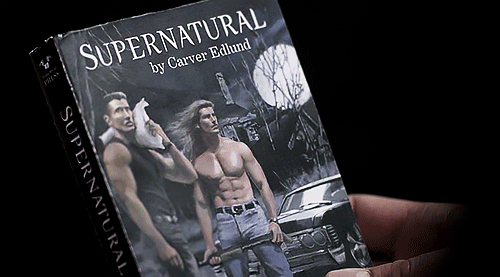
Series Masterlist
Pairing: Dean x Reader
Warnings: Meta baby. Pure meta.
Word count: 2,100.
Chapter Summary: Your google search turns up something unexpected.
A/N: No author in this one for... reasons. Also this one is kind of short and lame. A means to an end if you will, but trust me, Ch 4 is a doozy. P.S it’s nearly 3am so Chapter 4 will be up when I wake up, ya dig.
Ao3 if you prefer

It’s almost funny how dramatic the voice in your head wants to be about those suited criminals and yet it doesn’t care to elaborate on anything important. Like, say, your imminent death. The mention of it was so casual, calm, but a couple of weirdos want to pretend to be insurance adjusters and suddenly it’s all pretty prose and run-on sentences. Flowery language about broad-shouldered men in roaring muscle cars that are going to change your life. She’d kept going while you’d interviewed Maggie Hall. She’d harped on and on about how you couldn’t stop thinking about them.
Of course, you couldn’t stop thinking about them, she wouldn’t shut up about them.
After an entire monologue about the way the paper felt in your hands and could never be replaced by computers—purists are the worst—you finally get to leave. That's when you get some respite. You’re walking out into the late afternoon sun and thanking Maggie for her time and it's bliss. Maggie's story sounds a little off, after years doing this you have this gut instinct for when you should investigate further. Funnily enough, you have drama in your life that you’ll submit a valid claim anyway. Just so you can get this cursed case out of your hair. You might even hurry it through the system before the thing has the chance to kill you.
You’re still not sure how a case could kill you. You’re a pencil pusher at best and the interview with Maggie is an excellent example of the majority of your fieldwork, obviously excluding the criminals at the start. Unless your demise is death by papercut.
For now, you’ve given up trying to fathom out the voice you’re hearing, especially since she's chosen to once again go radio silent. If she won’t say anything useful, like say how not to die, then you were going to have to figure out how to skip ahead on your own. Since she kept talking about the imposters you’d met that day, they seemed to be an excellent place to start.
CNK 80Q3. Ohio plates. That's as much as you know without google.
That evening you set yourself up in the same way you would to work from home. There's a desk in the corner of your dining room with a chair that offers enough lumbar support for the longest of research sessions. Although it’s your personal laptop and there’s not normally a large glass of wine sitting next to you when work.
After it powers on you’re assaulted by the usual pop-ups; windows you forgot to close last time and your emails. Procrastinating is not a new routine, and you’re on a mission, so they all get minimized instead of closed completely. Then you open a new browser window and a stark google homepage stares back at you. A hopeful new beginning.
CNK 80Q3. You’re genuinely surprised that she hasn’t started talking again to describe the change in the air as you type in the plate number. Or some drivel about the way your fingers emphasize each letter and number. It’s all there happening anyway, making the moment foreboding, but your narrator doesn’t seem care.
The first row of results are images. Weirdly its images of the license plate itself. That doesn't strike you as odd at first glance and then you think about it a little more. Why are there so many pictures of this particular license plate? Who is running around taking these pictures? You're pretty sure if you typed in your own plate number there would be no pictures of it. And then you see some shopping results where you can actually buy the plate. While the online shops might explain the images, it only really poses more questions. Why are so many people buying that license plate? What’s so special about it?
You take a sip of your wine before you scroll further, savoring the taste as well as the way it relaxes your shoulders. You don't own any 'fun' novelty coasters that say it but you're inclined to agree with the statement you've heard before. Wine really does make everything better.
You’re not yet into the murky depths of page 2 but you’re far enough down the page now to make it past the sponsored results. These links come thick and fast from websites that all seem to have one word in common. Supernatural.
Then you see your salvation. A page called Supernaturalwiki—the link is simply titled: Impala—and you stop scrolling, a grateful sound slipping past your lips as you do. Wiki, you know that word. Like Wikipedia. Wikipedia has references and moderators', clear and concise explanations. This was the easy way out you were looking for.
That’s what you hope as you click on the link anyway. Your naivety lasts all of twenty seconds before the page loads. With its stock image of a 1967 Chevrolet Impala, and a quote about it being the most important object in the universe.
Or it's the most important object in some books at least.
Further clicking and longer sips of wine reveal it’s a series of books called Supernatural—with the title of the wiki you should have seen that coming. These were story after story of ghosts and demons and angels? There are pages that describe monsters, urban legends, and two men. Sam and Dean Winchester. They each have dedicated pages with their whole lives mapped out.
Sam and Dean are fictional brothers and apparently the heroes. Each of their respective profiles begins with an illustrated image from book covers, and then a series of quotes that contradict those pictures. Then their lives are intricately detailed, or should you say they are chronologically recorded according to each book. You would read their histories in full if it wasn't for how tiny the scroll bar is, indicating that these profile pages are ridiculously long.
You sit back in your chair and take a deep breath in the hopes of it being soothing. Or answering all your questions. It does neither. You have no answers and more stress.
This went beyond two men pretending to do your job now. Those guys were driving around in a car with fictional license plates. What was this? Some weirdly immersive cosplay? Was that something Sam and Dean did in the books?
Even so, those two guys weren’t roleplaying at comic con, they were actually in that woman's home. If you hadn't arrived they could have done anything. They could be doing anything now.
There's a ding from the kitchen which means the frozen meal you’d thrown in the oven is ready. Not that you stop thinking about this while you go and grab it because the more you think the less sense everything makes. Like why is a narrator who, until now, was obsessed with those guys, so very silent all of a sudden?
Back at your desk with hot food, you head back to google to see if you can buy these books anywhere because knowledge is power. Unfortunately, not even Amazon has copies. It’s only when you add the term “ebook” to your search do you find a Tumblr blog with links to download all the files, split into two categories. Published and unpublished. There are a lot of Supernatural books and from the looks of it there’s an equal amount of drama over how the unpublished ones got out.
You start downloading them without consciously making a decision to read them. Downloading kind of happens because your macaroni cheese is too hot for your mouth to handle yet, and your hands still need something to do. Besides you didn’t necessarily need to read all of them, if they were truly terrible you’d delete the files. No harm, no foul. But if this was the only way to get answers then you and your kindle were going to be pretty busy this weekend.

“Morning Laura.” Nobody likes Mondays, yet you have a little bounce in your step having made your usual green tea, got dressed, and driven to work in complete and utter silence. In fact, you’d heard nothing all weekend. The caveat was that, yes, you’d spent all weekend reading those books.
You liked reading and without discrimination. Trashy romance novels at the airport? You betcha. Fantasy books thicker than your mattress? Sure thing, order a pizza. But a mystery? Well, those were your favorite. Of course, the detective needed some sort of sketchy backstory and there had to be a fishy amount of red herrings. Most importantly there had to be something to solve. It was an elevation of your day to day life and you always get sucked in. In your job, you try to solve the most benign mysteries; people faking insurance claims. More often than not there isn’t even a mystery to solve, someone really did slip and break something. So, a mystery that grabs you out of nowhere is like a promotion for you, a challenge.
That had been how those Supernatural books had dragged you in. Ghosts and ghouls you could take or leave, you might have stopped reading if that’s all there was. Then this Carver Edlund went and put in that damn side plot about their missing father. It was too enticing, addicting. From the cryptic disappearance to the indecipherable journal of clues. John Winchester would be the death of you.
Or case 24-01 would be. The jury was still out on that.
And now it’s Monday. You’ve heard nothing more from the voice in your head—it may have been a low-level case of carbon monoxide poisoning—and the boys are so close to figuring everything out you can taste it. Technically they know John is alive by now, you finished Shadow some point yesterday afternoon and felt yourself choke up at the emotional goodbye with a father they just got back. But they still have no clue what he's up to, which is a hideous funhouse mirror reflection of your own life. Hopefully, by the time they figure out John’s game plan, you'll have your life figured out too. And fingers crossed figuring everything out will involve staying alive as well.
“You look like you’re feeling better this morning.” Laura is her perky self, always a little too happy for this side of 9am.
Oh right, you went home sick on Friday. You should remember things like that. “I think it was a bug or something I ate maybe.”
“Sure, sure. One of those convenient Friday bugs.” She winks at you.
If she accused you of that say, last week, you’d have laughed it off given that's a thing everyone has in common; trying to skip out on work. So, that's what you try to do this side of the weekend. You push out something that hopefully resembles a regular person's laugh like you’re in on the joke. You have to fake it because you’re still thinking about Providence. The book you’d finished that morning instead of watching the news. You’re still wondering if Sam is starting to move on after Jessica.
Needless to say, you understand now. The many fan blogs and the artwork you’d glanced at before you started reading. All those things that you’d disregarded as an unhealthy fascination for a bunch of books. Now you’re one of them, obsessed. Walking into the office with your kindle tucked in your bag and Salvation just begging to be read.
This goes beyond finding John. That plot got its hooks in you but you’ve known John was alive since Home and you’re still reading. You could also blame this on your general love of reading except it goes beyond that too. Honestly, it’s hard to pick one thing. They’re really great books. Sam and Dean have such turbulent lives but they still have each other. They’re snarky, lost, angry, and caring. They’re both so different but the sibling relationship is so real. And the stories go beyond a new monster every book, there are these huge interesting story arcs that you couldn't stop reading if you tried. John Winchester had been the first example of these addictive plot points, but not the only one.
“Y/N?”
You snap your head up, “sorry, sorry.”
“I was only saying you’re going to be here all day then, lunch?”
Even though Laura must see the decision on your face she still pretends to hope until you start speaking. “Actually I have a lot to catch up on so I’ll probably be working through. Tomorrow?”
She smiles brightly and nods, “sure thing.”
As bad as you feel about lying to Laura she has presented you an opportunity. Everyone thinks you were sick on Friday. They even think you're behind on your work and they don’t know you’ve already conducted the initial interview. Which makes your decision to sit at your desk and prop your kindle up next to your screen even easier. Nobody would notice the difference between you concentrating or reading. If you skip lunch you might be able to get to Bloodlust out of the way too.

Continue to Chapter 4.

5eva tags: @divadinag @darthdeziewok @fluentinfiction @witch-of-letters @supernatural-teamfreewillpage @magnitude101999 @alexwinchester23
Dean babes: @thewinchesterchronicles @akshi8278 @bloodydaydreamer
StrangerThanFiction tags: @jaylarkson
#dean x reader#supernatural fanfiction#spn x reader#dean winchester x reader#spn fanfiction#supernatural#spn#spn fanfic#supernatural fanfic#dean winchester#dean winchester x you#dean x you#dean x y/n#dean dean the soft lil bean#honestly this isn't a strong chapter and I kind of hate it but I need it to get to the last part because GUYS#I actually wrote a fucking outline for this#can someone please be proud of me#like you don't need to read this just be proud of me#anyway it all comes together in the end and just EUGH chapter 4 is way better just stay with me till chapter 4#LITERAlly the next chapter#also I am tired so if this is poorly edited as well as poorly written then I am sorr#y
30 notes
·
View notes
Text
2020 Books Read So Far
Note: Most of these are audiobooks (listening to books counts as reading books and if you disagree I’d ask you to consider why you believe that), books I started and didn’t finish will be listed but not reviewed, and all my opinions are extremely subjective. I’m putting this on this blog because I want to and I think it’ll help me keep track of what I’ve read if I write it down in a couple places.
Some notes:
I’m surprised that most of these are nonfiction! I don’t usually think of myself as a nonfiction reader.
Having audiobooks has made me way more productive as a reader, since I can read while I’m doing repetitive tasks at work, when I have to stand on the bus, when I’m running, etc.
Naked, by David Sedaris
3/5, the audiobook was “unabridged selections” which means “we didn’t edit the individual essays but you’re only getting half the book”– it would probably have been a 4/5 if it was a whole book. I liked that Amy Sedaris was reading parts of it, but that’s because I like her more than I like her brother. This is sort of an example of the difference between “comedic” and “humorous,” because it’s definitely the latter.
Read it if: you want to read something pretty fucking weird.
Lafayette in the Somewhat United States, by Sarah Vowell
4/5, I saw this recommended a lot when Hamilton first came out so it’s been in the back of my mind for a good while. The book had a great cast, and having different people reading the historical quotes was an excellent touch!
However, I think Vowell’s conversational style is a little jarring here sometimes. It’s like “wait, why are you talking about Bruce Springsteen, I’m not that familiar with his work but he definitely isn’t from Revolutionary War times.” I got her book Assassination Vacation at a used bookshop recently as well, and both books suffer from post-2016 hindsight, where she’ll say something about how incompetent and foolish the politicians of her time are, and I just have to snort to myself and say “Sarah, you’re going to lose your goddamn mind soon.” That’s a bit of an unfair reaction, but it’s hard to avoid having it.
I was also, maybe unfairly, expecting to learn more than I did. The problem is that I know a Lot about the Revolutionary War, and from the introduction I thought we’d hear more about Lafayette’s later life (my knowledge drops sharply after about 1810). The book basically ends after the Battle of Yorktown, though.
Read it if: you have not seen/listened to both Hamilton and 1776, or if you want to read a summary of the Revolutionary War with a focus on one French captain.
Assassination Vacation, by Sarah Vowell
3/5, honestly maybe a 2.5/5. Okay, so. Either I know a lot more about American History than I felt like I did or this is again a very surface level thing. Part of it is because she spends 123 pages on Abe Lincoln. There are 255 pages total. 2/3 of the states I’ve lived in are Indiana and Illinois, two states that fight about claiming Lincoln as their own, and I’ve been to D.C. 4 or 5 times, so I feel like I know enough about Lincoln. I know about John Wilkes Booth, and his brother Edwin who saved Lincoln’s son’s life, and the death train that took Lincoln’s body around the country. I did enjoy learning about the doctor who was probably conspiring with Booth and how he ended up saving tons of lives in prison when there was a yellow fever outbreak (also to be briefly unbearably nitpicky: I think she might have mixed up dengue and yellow fever? She calls yellow fever “breakbone” but I can only find instances online of people calling dengue fever that. Maybe they called them all breakbone in the late 1800s. If anyone reading this is an epidemiologist, let me know).
It was interesting to hear that Charles Guiteau, killer of President Garfield, was part of the Oneida cult. I’m trying to think of anything notable she said about Leon Czolgosz, killer of President McKinley. I guess she talks about how people assumed he was a foreigner because of his name, but I already listened to “The Ballad of Czolgosz” in Assassins, so I knew “Czolgosz, angry man, born in the middle of Michigan.”
This one is from 2005 so the politics stuff is a little more interesting, since at the time I was busy learning multiplication and spending one entire baseball season learning about baseball and following my team (they won the world series, I have excellent timing). I will say that in 2005 we did have Google, so I am again annoyed with some of her asides and personal anecdotes. Look, if you go to the Hemingway house and you don’t know there will be cats there, that’s on you if you don’t bring your Claritin. Hemingway is associated with only two good things, six-toed cats and Daiquiris.
She also does not acknowledge that the parties basically switched platforms? Lincoln’s Republican party is not today’s Republican party, in fact kind of the opposite, so it’s weird that she starts the book with a dedication that’s like “to my lifelong Democrat grandpa, he’d be pissed I dedicated a book about 3 Republicans to him.” I guess she does sometimes say stuff like “how did Lincoln’s party become Reagan’s” (paraphrase), but she doesn’t actually get into it.
Speaking of Democrats, she literally spends more time talking about Pablo Picasso than she spends talking about JFK. She doesn’t explain why she didn’t talk about JFK, but it seems bizarre to me to write a book about American assassinations and to leave out John Fucking Kennedy. Literally I’ve talked more about JFK in this section than she did in her assassin book. It’s not until page 253 that JFK gets a full paragraph. There are 255 pages total. Truly, if she’d taken a paragraph to be like “I’m focusing on the presidents who were elected before 1900″ or “the presidents whose immediate families aren’t still alive” or even “I didn’t want to travel to Dallas for research” or SOMETHING to explain why she left out JFK, I would have understood it more instead of flipping through the pages wondering what was going on.
Read it if: You do not listen to too many history podcasts and you didn’t read the Wikipedia page for the musical Assassins. And I guess if you don’t want to acknowledge that JFK did also get assassinated and that was kind of a big deal. Actually just listen to Assassins instead.
And Then There Were None, Agatha Christie
5/5 as a mystery, 0/5 for its original title (not gonna say it here but if you’ve ever googled the name of HP Lovecraft’s cat, it’s along those lines). Less than 6 hours, narrated by Dan Stevens from Downton Abbey, fairly ideal as an audiobook. I am 95% sure I’ve already read this, because I spent the summer before I started high school reading every Agatha Christie book in the library (I do not have a list of all the Agatha Christie books in my library the summer of 2010, so there is some question).
Read if: you want to hear the guy from Downton Abbey deliver the line “I’m not a complete fool!” in a tone that makes it sound like “I’m not a fucking moron!” Sidenote: Can anyone tell me if Brits say “solder” by pronouncing the L that I’ve always heard as a silent L? Or if Dan Stevens just fucked up that one word?
Over The Top: A Raw Journey to Self-Love, by Jonathan Van Ness
4.5/5
This was a super enjoyable audiobook! It’s a testament to JVN’s considerable charisma that this book is full of him giving people in his past who would rather be anonymous Russian names, and it doesn’t get grating (as a Marina, however, I was shocked to not hear my name at any point; most of the other Marina’s I’ve met in my life are Russian). JVN has had a wild ride in life, and it’s a really raw, honest story of how he became who he is. I will say that if you are interested in reading this, please look up the trigger warnings; there are a lot of things that could be triggering to people.
I feel a little bad at how much more I liked this one compared to Tan France’s memoir, but I also feel like whoever was ghostwriting that one did a bad job at making Tan seem... not extremely defensive, cocky, and prickly (it seems that JVN did not use a ghostwriter; Tan’s on the other hand, let the phrase “I’m proud to be a petty bitch” make it into the final proof several times). Also JVN advocates going to therapy in his book, while Tan kind of says that you should only go to therapy if you have no friends or family or life partner to talk to, which I fundamentally disagree with. I don’t know. I also feel like, if I were to get a makeover from the Fab 5, Jonathan would love my hair (I have great hair) while Tan would say that I’m dressing too old for a 24 year old and then take me to fucking Lane Bryant or Torrid (I wear a size 16 US so IRL options are limited).
Read if: You like Queer Eye or Getting Curious with Jonathan Van Ness
Medallion Status, by John Hodgman
4.5/5
I really like John Hodgman’s podcast, and I got to ask him a question at an event he did at the Field Museum and he was very nice, so I went into this inclined to enjoy it.
And I did! I had a good time reading it. I read it the first week of January and now it’s the second week of February so I have already erased much of the book’s content from my mind, but he somehow made the perspective of being a formerly kinda famous person really interesting. I would also recommend Vacationland, particularly if anyone wants to write an au where Nursey, as a New Yorker, has a vacation home in Dex’s town in Maine. That’s right, I brought it back around to the topic of this blog. And that would be a fucking fantastic au.
Read it if: you like memoirs! it’s a good one.
Murder on the Orient Express, by Agatha Christie
Gonna give this one a 3/5 for performance, because Dan Stevens (again, because I liked his narration in the other one) does a really annoying American accent for a few characters, and an extremely bad Italian accent for another. I’m starting this review only a few hours in, so if it turns out that the Italian man is not Italian, I’ll revoke my criticism. Still a 5/5 mystery, though. I did have to stop many times when they were talking about Istanbul to go over to Spotify and play “Istanbul (Not Constantinople)” by They Might Be Giants.
Books abandoned in 2020 (so far) (no real spoilers, I didn’t get more than a few chapters into any of them):
The Unhoneymooners, Christina Lauren
I got to a point where the main character was telling a lie that would put her newly accepted job into jeopardy, and it stressed me out so much as a relatively new hire that I stopped listening for the day and started another one, and then the week had passed and then the library took it back. I think I’d enjoy it more if I was reading it physically and I could control how fast I got through awkward parts (I am practically allergic to secondhand embarrassment). The performance was good and I did get a hankering for cheese curds.
Me Talk Pretty One Day, David Sedaris
I had like three audiobooks checked out at the same time, and even though this was again an abridged version, I just didn’t have time for all of them. My mom has a physical copy, I’ll borrow that at some point.
The Witch Elm, Tana French
This is one I may revisit someday. The main character is kind of an asshole, which is the point of his character I think, but it made it hard to get into the story. It’s also a 22 hour audiobook, which is kind of insanely long. Additionally, the narrator has a very slow way of talking, but if I tried to speed up the rate of playback I had trouble understanding his accent (I think I just have trouble processing really fast speech in general as well, but I would’ve had an easier time understanding someone with the same accent as me). Anyways, someone put a hold on it at the library and then I didn’t check it out again.
31 notes
·
View notes
Text
Why I Don’t Have a “Sacred Name” (for Pagan & Witches Amino’s #OWC)

Note: this was originally posted on the Pagan & Witches Amino app for their Official Weekly Challenge, “Name Game.”
When I first began investigating “alternative spirituality,” witchcraft, and magick, it seemed like everything and everyone had a name. Everyone had a neat and tidy label for their spiritual path, from Wiccans to eclectic pagans to secular witches. And a lot of these paths came with craft names.
Now, I really like the idea of magickal names. A lot of them are very beautiful, and many of them perfectly capture the essence of the person’s role as a witch. But every time I’ve thought about taking on a new name for myself, I’ve gotten very uncomfortable.
Similarly, I’ve spent the past two years trying to find a label for my spiritual path and for the type of magick I do. I was excited to find a community of people who believed and practiced the same things I did. I’ve researched Wicca, Heathenry, Irish Reconstructionist Polytheism, Gnosticism, Kabbalah, Western occultism, and more. And although there have been bits and pieces of each of these systems that have appealed to me, none of them felt right for me. Even calling myself an eclectic pagan doesn’t quite fit, because my spiritual path is strongly influenced by some non-pagan sources.
Recently I’ve been really into shadow work, and it was by doing shadow work that I discovered why the idea of labels, and specifically of taking on a new name, makes me so uncomfortable.
I grew up in the Church of Jesus Christ of Latter Day Saints, better known as the Mormons. The Mormon church is a Christian cult, according to Walter Martin’s definition of a Christian cult as “groups that follow the personal interpretation of an individual, rather than the understanding of the Bible accepted by mainstream Christianity.” (Quote from Wikipedia) Although they are most famous for openly practicing polygamy in the 1800s, there’s a whole bunch of skeletons in the church supply closet — but that’s an issue for another post. For the sake of this post, all you need to know is that it’s a very conservative, pseudo-Christian group with a lot of secrecy around their rituals. Even members of the church aren’t allowed to know what happens at these rituals until they’ve experienced them… but of course, because it’s 2019 and the Internet is a thing, you can find out with a little bit of digging.
The Mormon church has one ritual known as the “endowment,” which is sort of like the final level of initiation — after your endowment you’re a full member, with access to secret teachings, and a guaranteed place of honor in the afterlife. (The ceremony itself is actually really similar to a lot of pagan rites, with reenacting myths, anointing with oils, and swearing oaths.) This ritual is also where the infamous “magic Mormon underwear” comes from. During this ceremony, the participant is given a new name (note that this name is given to them by someone else, NOT chosen for themselves). This name must be kept a secret, to be revealed only to a select few, such as church leaders and the participant’s husband or wife (assuming that they marry another Mormon).
Here’s the catch — you know those myths about how telling the Fae your true name gives them total control over you? Turns out, Mormons operate in a similar way. According to one common teaching, women cannot enter the highest level of heaven unless their husband (who has to be Mormon, of course) calls them in by their secret name. Whereas magickal names in pagan circles are often a source of personal empowerment, secret names in the Mormon church are a means to control people.
Maybe that’s why I’ve never wanted to choose a sacred name. In the Mormon church (and in other Christian traditions, such as Catholicism), choosing a spiritual/religious name comes hand-in-hand with making a covenant with God and promising to give up earthly pleasures. Maybe this is just me being a godless heathen, but I kind of like my earthly pleasures. A God who wants me to swear away things that make me happy isn’t a God I particularly want to swear myself to.
I see myself as a part of the same divine Source that birthed the gods and goddesses. I approach my gods as equal partners, not as a subservient slave. I am worthy of their patronage as I am, and I don’t need to change my identity to be deserving of their blessings, or to be in touch with my own spiritual and magickal power.
I feel sort of like Agnieszka, the main character from Uprooted by Naomi Novik (which is one of my favorite books). In the story, Agnieszka is being initiated into a magickal order, and is expected to choose a new name as part of her initiation. Here’s what she says:
“But it all felt wrong to me, anyway. I’d gone along with the elaborate dance of the thing, but I knew abruptly that I didn’t want to change my name for a new one that trailed magic behind it, any more than I wanted to be in this fancy gown with its long dragging train that picked up dirt from the hallways. I took a deep breath and said, ‘There’s nothing wrong with the name I already have.'”
#long post#mine#pagan & witches amino#witch#witchblr#magick#pagan#paganism#wicca#wiccan#exmo#exmormon#ex lds#lds#mormon#spirituality#new age#chilling adventures of sabrina#uprooted#naomi novik
223 notes
·
View notes
Text
Necromancy in Earthblood society: headcanons and theories
( Wow, haven’t posted one of these before. Let’s see how it goes!)
Personally, I don’t believe necromancy is as unnatural - dare I say, unrealistic- and completely revolting in the tdp world as it is in D&D, any zombie-esque story, or Frankenstein (yes, I consider that a form of necromancy; get used to it). My reasons for claiming these examples as “unrealistic” is largely due to the use of corpses that are already in a state of decay. Rigor Mortis, the state in which a corpse’s muscles and joints stiffen due to the lack of oxygen needed to produce the chemical compound adenosine triphosphate (ATP) which is necessary for the relaxation of muscle fibers, sets in 2-6 hrs -depending on body size, sex, physique, environmental condition, etc.- and ends only when the muscle fibers themselves begin to decay. This means that a corpse is physically incapable of unassisted movement, much less eating/digesting brains. So, in order to avoid this mistake (which can be easily identified by looking up rigor mortis in Wikipedia or, you know, a freaking book! Mary Shelley lived in a time when this information was either difficult to find or being discovered; what’s Hollywood’s excuse?) a necromancer would have to do one of two things: require a really, really fresh corpse (like in the 1968 version of, “Night of the Living Dead” (the corpses had to have died recently in order to be reanimated));or be able to revive the organism on a cellular level, this would also require the necromancer to stimulate rapid cell reproduction in order to keep the revived cells from immediately dying due to the lack of oxygen, again. I have yet to watch or read anything that applies the latter form of necromancy (if you know of any, please leave a suggestion in the comments), or at least acknowledges it’s application. This is one of the first reason why I hope to god it’s implemented in, “The Dragon Prince,” universe. The second is how it can also be applied as a form of healing. That’s right my DMs and adventurers, your healer can theoretically use their abilities for necromancy and vice versa; let that sink in for a moment. This would further support my belief that Earth mages are capable of healing, just a different form of healing than would be used by Sun and Ocean Healers (I’ll write a post to further discuss what these different forms of healing are, I swear). Anyways.... that’s theory/headcanon thingy #1 of this list. (Just gonna tag @dragonprinceofficial , in case anyone finds this particularly interesting....couldn’t hurt, right?)
Necromancy, of this sort, cannot bring dead loved ones back. The brain is one of the first organs to decay minutes after death, which means that the memories stored within those neurons would be lost; even if those cells were revived, the explicit and possibly implicit memories of the subject would likely never return. Of course, since this is probably an exhausting process and would require a lot of time to complete, the necromancer would have to prioritize the neurons responsible for respiration and circulation of blood in order to keep the revived cells alive throughout the ordeal (kind of like an internal, natural life support machine...actually, if Xadia has the technology for life support machines that would take a load off of the necromancer/s; instead of immediately worrying over the neurons, they could focus on regenerating the major organs then go back to the brain later on......wait, no, that’s a tangent...getting back to the point), which means that even if the person died only a little while before, it would take even more time for the necromancer to finally regenerate the parts of the brain believed to store explicit/implicit memories. This isn’t taking the spirit of the subject into consideration. We know that spirits do exist within the tdp universe, the creators have even stated that it’s possible to communicate with these spirits via moon magic (though they also stated that some most magical abilities are not exclusive to a single primal source, but that’s not important right now). But can an earth mage call the spirit of the individual back into the body? I’m going to assume not since spirits or souls are not typically considered part of the “natural-earthy” world, but the ethereal one. (I am not in any way an expert in neurology, biology, anatomy, or any other scientific field. All of the above is based on my very limited memory of anatomy class and quick fact checks. Do not quote me on anything. If you are an expert and see a mistake, please, correct me.)
For the reasons previously mentioned, I believe Earthblood elves would outlaw the resurrection of the recently deceased; for the sake of the individual’s family and friends. It’s too much for grieving loved ones to handle, even if necromancy is normalized within their society. Perhaps resurrecting elves, period, is taboo, simply because of ethical concerns. Of course, some, if not many, would likely disregard the established laws in favor of exploring new regenerative spells; perhaps, even attempting to create chimeras from multiple corpses. If my assumption that Druidic orders exist within Xadia is correct, then it is likely that mages whom dabble in this practice are either excommunicated, rejected, or forced to hide their research and experiments by their elders.
All mages gifted with Life-earth magic (spells that focus on flora and fauna) have the ability to learn necromantic spells. Botanical mages have an easier time with necromatic spells, that’s how they revive dead plants. However, neither party can preform necromatic spells in a different field (Botanical mages can’t revive animals, and Zoological mages can’t revive plants).
NECROMANCY IS FREAKING HARD!!!! You know the amount of studying it takes to keep humans alive? Doctors are required to have an intimate understanding of bodily functions, including cellular reproduction. Healers in the tdp universe would probably also require this knowledge along with spells and accompanying runes. But you see, the healer’s patient is alive. That means that their body is, for the most part, keeping itself alive. Which allows the healer to focus on the main issue. The necromancer is literally bringing their subject back from the dead. They not only need to know how the body works, or which spells will sustain the subject; but also which parts need to be revived first, which other organs are required to keep others alive, which veins and arteries to reconstruct, how many capillaries will be needed to deposit nutrients to the revived cells, how to reconstruct an organ from literal mush, which bacteria is good for the subject and which needs to be purged, and the list goes on, and on! Necromancers need to be a specialist of specialists, in a medical sense, in order to make a reasonably functional being. Then, one has to take into account the amount of magical, mental, and physical energy required from the mage to perform each and everyone of the spells on every single structure within the body in succession. It wouldn’t surprise me if this was why dark magic was created in the first place! I’m not even sure Aaravos could pull something like this off by himself. Of course, if the mage doesn’t want a self aware lackey, they could cut corners in regards to the construction of the brain; possibly leave out the appendix, one of the kidneys, maybe part of a lung, probably the voice box, hair, pituitary glands (in regards to human subject)....if longevity isn’t a priority of the caster, then there’s much that can be ignored to save time. It’s quite possible that, in the end, the reanimated subject won’t even appear as they were meant to.
I might add a second part to this list later on, only time will tell. Feel free to ask any questions regarding this and other post, or add any of your own headcanons/theories; I’d love to hear from y’all! I hope y’all enjoyed.
Thank you for reading!

#the dragon prince#tdp#tdp headcanons#tdp theory#tdp elves#earth elf#earth primal#necromancer#necromancy#tdp earthblood elves#dnd
100 notes
·
View notes
Note
Hi, if you wouldn't mind, I'd like to posit something about David Bowie's MBTI type. For about two years now I came across him - never having listened to his music, only knowing him as a public figure. I feel like this is an advantage because I don't try and define him based on my subjective interpretations of his songs. I also think it's the same as typing an actor by their movies (although not to the same level of difference), in that it's a bad metric for an artist's cognitive preferences (1)
I started off my usual research route through Wikipedia. Not a lot of stuff there aside from his shying away from a concrete and consistent persona. Signs of possible inferior Se/Si, in his promiscuity and idealisation of the life of “the average Joe”, and a reticence to define himself. But this was all just an outside perspective. Then I trawled through his biographies and found the most reliable to be Starman, a literal and as unbiased account of his life start to finish. (2)
My impression was definitely not on the Te/Fi axis. Bowie was a terrible businessman. He seduced and flattered his way into opportunities, but literally burned through money and friends alike on his ascent to the top, terrifying himself at times with the amount of debt he’d run himself into - he also showed noted dislike of all the practical process of being a commodity, although he was fully aware of his image. He was detached in relationships and confessional and turbulent about feelings. (3)
At this point I stumbled upon a post my funkymbti, who ran a commentary about Ni-dom mistyping under a picture of Bowie, typing him as INFJ, and as you did citing his interview about the Internet. I was certain then - as an INTJ, I felt even a kinship to him, even as it confirmed his Fe/Ti axis. But - and this is for a long time - something wasn’t right. All my mental experiments of placing Bowie in various scenarios played him out as too subjective to my archetype - I leaned heavily on Fe/Ti (4
And hardly at all on his Ni/Se, using stereotypes such as his clear intuitive preference and his hedonism as a rock star. I also typed him as 3w4 for a long time before learning more about enn. 4 and agreeing with enneagramer that he was a 4w3. I have a strong typing for Angie, his first wife, as an ESFP (although definitely a disordered one) and I even leant on her strong Se as Bowie choosing a complement to his weakness - it is quoted he “liked the way she thought”. (5)
After a hiatus, I started searching again. I decided to look at the typing of maaarine, whose typing I don’t always agree with but has surprised me when I’ve incorrectly typed someone before, read and dismissed her typing, and the learnt more or gained a new perspective and realized she was right. To my surprise, she had typed Bowie as ENTP. (6)
I ruminated on this for a bit. I had staked my certainty of Bowie’s Ni/Se into funky’s typing and explanation. That Internet interview had never really stuck with me as Ni, just intuitive. An interview he’d done in ‘83 with Susan Sarandon I also tried to watch through that filter and it never really read true. I never really had PROOF Bowie was Ni except from my own certainty, and put my disconnect from it down to obviously never being able to be sure on cognitively typing any public figure (7)
and especially a chameleon such as Bowie. The depth, the searching Ni itself, I had dismissed as ephemeral. So I looked up two INFJs I am 99% certain of. Daniel Day Lewis and Leonard Cohen. Both of them were painfully familiar, almost comically. The Fe/Ti was there, but cushioned by the weight of Ni, undeniable, unmovable Ni. They didn’t reinvent, reuse, extrapolate, ripple and shimmer. They were heavily introverted. I thought of interviews were Bowie was alike - only those where he was (8)
(I only include your first eight asks because that’s all I received, although it looks like you went on)
I hope I don’t come off as flip when I say that my response to all this is “Cool, you know more about David Bowie than I do!” I am not a Bowie fanatic; I’m a music fanatic, and while I did some research for my initial typing, I did not dive deep into any biographies, and I also wrote that almost four years ago. It sounds like you’ve dedicated a lot of time to this research, and that’s very impressive. It also means that you’re the Bowie expert, and not me.
I think the conclusion you’re eventually coming to here is that David Bowie is, indeed, an ENTP, and I would actually agree with you. I don’t feel confident narrowing down his judging axis without more personal research, but he is probably an ENxP rather than an INxJ. My initial typing came from only a handful of interviews, and there’s a lot about my early method of typing celebrities that I disagree with now.
This blog is the place well-intentioned promises go to die, but there are several other artists I want to retype at some point (like Chris Martin—also an ENFP, definitely not an ESFJ), and so that project might happen in the future.
Anyone else with thoughts on Bowie’s type, feel free to send in an ask.
#mbti#david bowie#ask#entp#enfp#music#i'm sorry the rest of your asks didn't come through#i think tumblr may block accounts sending a lot of asks in a short period of time#which does a great job preventing the bot problem i don't think we had to begin with
10 notes
·
View notes
Note
Hiya :D I was hoping if I could ask you a question, if that's okay? Ever since episode 58 came out, I've seen a lot of debates about whether or not Yusaku has Stockholm syndrome towards Revolver. I've done a lot of research on the subject, and from what the series shows, Yusaku doesn’t seem to have the syndrome at all, towards Revolver, Dr. Kogami, or any of the Knights of Hanoi. But I’m seeing the term being misused a lot. So, I want to ask: What are your thoughts on the matter?
Thank you for asking this, anon, and I‘m sorry for the late reply. I feel like this response/post is a bit overdue since I know there a lot of fans out there concerned about the misuse and application of the term.
Because canonically, Yuusaku doesn’t, and has never, suffered from Stockholm syndrome.
To truly answer your question, anon, we’ll have to first analyze Yuusaku to see if he meets the criterion to develop the syndrome and then continue by figuring out if he displays the symptoms in the series.
Now, this is going to be pretty picture heavy and long, so bear with me. Also, this will contain spoilers.
All through season 1, Yuusaku is hunting for the truth behind the Lost Incident. He did at one point make the connection between it and the Knights of Hanoi, due to its other name, the Hanoi Project, hence why he hunts them as intensively as he does. He wants revenge and he won’t get it until the ones responsible pay for their crime.


Early on in the series, he states that the Knights of Hanoi are the only ones he hates. Does that mean he also hates Revolver?
Yes, he does. Revolver is just another piece to use in the search after the truth. However, Yuusaku never makes the guess that the leader of Hanoi is the same person as the mastermind of the Hanoi Project. Yuusaku is heavily driven by logic and never makes hasty assumptions but rather conclusions and only when he’s absolutely sure.
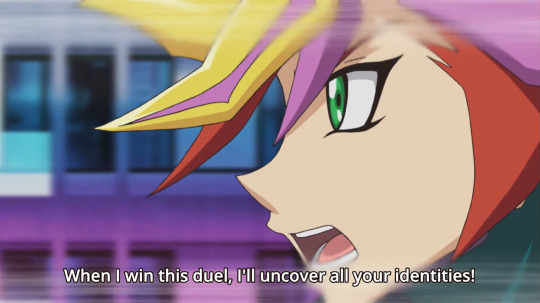

But we all know Yuusaku’s perspective shifted when he learned Revolver was his special person, as well as the one who made the anonymous report to uncover the incident. Shifted in the sense of learning where Ryouken came from, hence turning part of his mission into no longer being about crushing Revolver as a part of Hanoi but dragging him away from it. That’s important to remember.
Now, let’s move on to Stockholm syndrome.
The most common description of the term that most people uses, and the very basic one, is “a hostage developing sympathy for their captor”. Which isn’t entirely correct; it’s closer to the truth to instead say that the victims start to identify with their captors, especially when they to cope with the fact that they’re captured, feeling like their old life were empty and meaningless, or to sum it all up in one sentence; a psychological alliance as a survival strategy during captivity.
What everyone agrees on, however, is that it’s generally considered as a highly irrational condition, so no further argument is needed on that point. But just like any other psychological term, there is way more to it than just that.
And when it comes to Yuusaku, we don’t have to continue before it already falls apart.
Let’s go back to episode 58 that started this whole debate in the first place:

VRAINS tells us it was eight-year-old Ryouken.
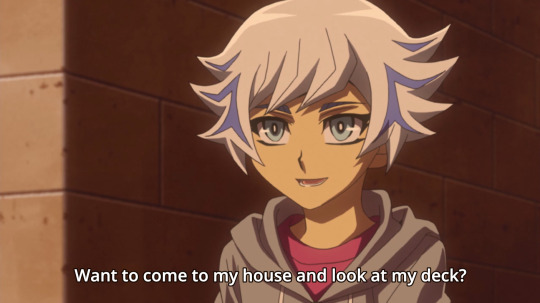
The show has so far not shown us how exactly the kidnapping happened, other than it was child Ryouken luring Yuusaku away, a method not uncommon to use when luring away others into captivity, and it’s clear that Dr. Kougami used it to his advantage.
Here’s the thing, though, and what most people may have missed or forgotten about; Ryouken luring Yuusaku away doesn’t make him the most responsible for Yuusaku’s captivity. The ones to blame entirely are the adults involved, and, most specifically, Dr. Kougami.

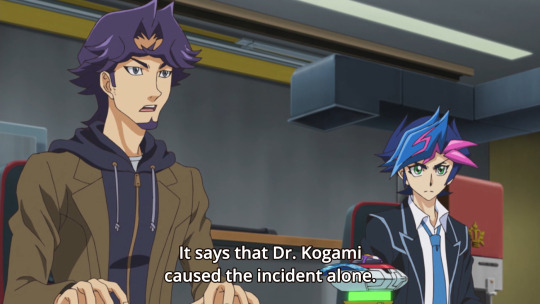
“But Ryouken is equally guilty since he was a part of it!”
Yes and no. Ryouken’s guilt complex has its origin from this since he did lure away Yuusaku (if he lured away the others is still unknown, but so far, it doesn’t seem like he lured away Spectre and/or Takeru). But Ryouken also confessed that he didn’t understand what was going on, which shouldn’t be too surprising due to being as young as he was. And putting such heavy blame solely on a child is questionable on too many levels.


Yuusaku himself has stated himself as well that Ryouken was, indeed, too young to be blamed for the Lost Incident.


In this specific case, the roles as kidnapper and captor aren’t shared by the same person, or even on equal grounds since that would mean Ryouken was just as involved in the project as Dr. Kougami himself, or even Vyra, Dr. Genome, and Faust. But he wasn’t due to his age, and it’s even implied that he was left in the dark, which would be more than understandable.
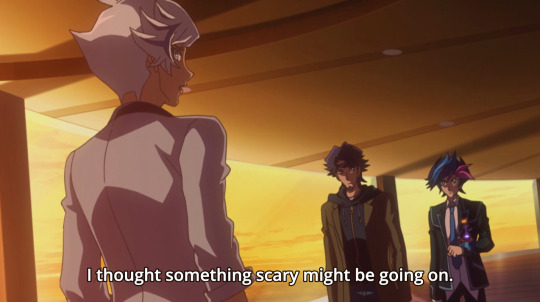

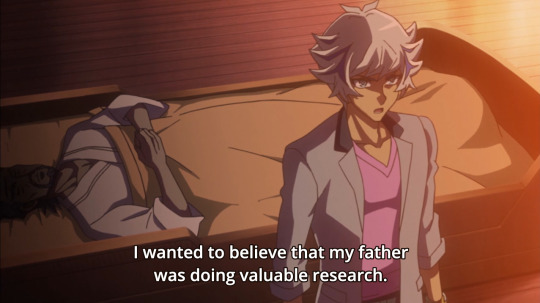
It’s worth mentioning as well that Dr. Kougami did admit guilt over dragging Ryouken into the mix to begin with, implying even further that he wasn’t involved more than the show suggests.
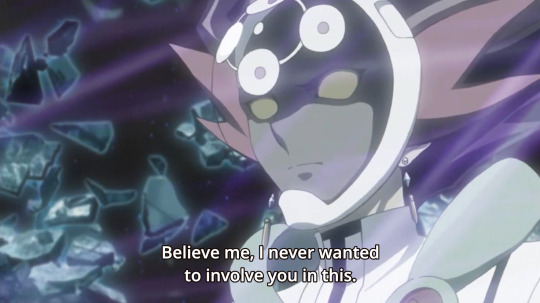
This is what we, the audience, get to know. But Yuusaku is aware of this as well, at least in a matter of it being a different person guilty for locking him away. In other words, Yuusaku never developed sympathy or psychological alliance with his captors; he makes a difference between captor and kidnapper just like the show portrays it. Furthermore, he thought for ten years that Ryouken was imprisoned as well:
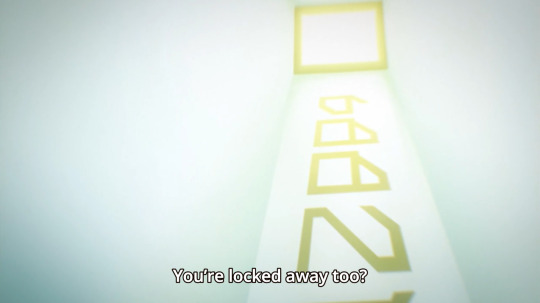
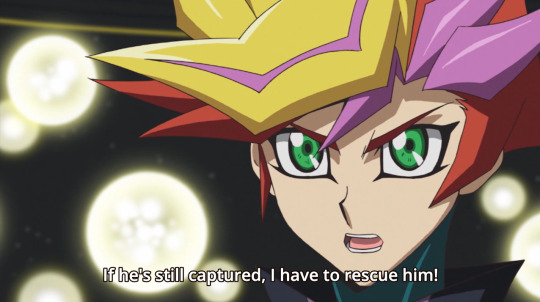

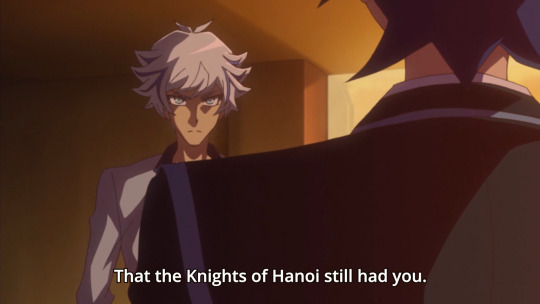
Based on all this, it’s not too far-fetched to assume that Dr. Kougami took Yuusaku away when Ryouken wasn’t in the same vicinity. Otherwise, he should’ve known that Ryouken was in cahoots with Dr. Kougami.
All Yuusaku’s hatred towards Hanoi is because of them imprisoning him, something a hostage with Stockholm syndrome doesn’t feel since the lack of hatred and negative feelings is the main factor for the condition developing in the first place. Wikipedia uses a quote from the psychologist Thomas Strentz: “The victim’s need to survive is stronger than their impulse to hate the person who has created the dilemma.” Nothing we see in the show indicates that that was the case with Yuusaku. He was a tortured, starved child who just wanted it all to end so he could go home, never once showing any sympathy as a way of coping or attempts to lessen the experience.
Now that I’ve taken apart the basics of Stockholm syndrome that most people are used to, let’s move on to see if Yuusaku actually shows the symptoms or not:
“One criterion is how the victim refuses to cooperate with authorities and rather let their captor be left unpunished, and Yuusaku hasn’t reported Ryouken for the Lost Incident or any other crimes, despite knowing all the details.”
While that is true, it’s also obvious Yuusaku is in no position to do so. Not only because of reasons stated earlier but also:
Yuusaku has obtained all knowledge through illegal means (he is a hacker, after all), and while Yuusaku isn’t afraid of his identity being revealed, it doesn’t mean he’s willing to give it away. SOL knows that Playmaker has the information, and they’ll do all they can and even more to uncover the identity of the insufferable duelist that causes them so much trouble. And Yuusaku hasn’t shown any signs of allowing that to happen.
SOL Technologies covered up the Lost Incident, so the public, as well as the authorities, wouldn’t know about it. And they will most likely continue to do so in the future.
Yuusaku hasn’t shown any hint of trust towards authorities in the first place; he’s taken matters into his own hands instead, as well as stated that he keeps to his own justice rather than anyone else’s.
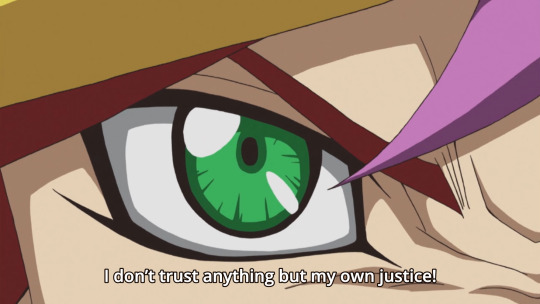
One can absolutely argue that the possibility of Yuusaku leaving an anonymous tip exists, but with all of these points stated, can he really? Would he really?
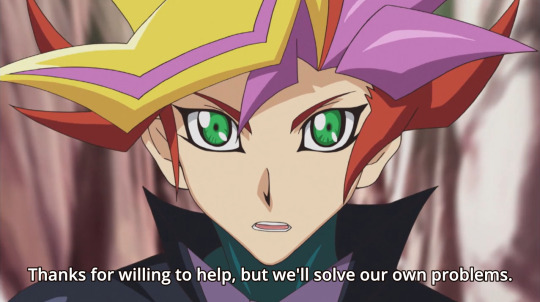
It’s not even about Ryouken specifically, because Ryouken isn’t the only person responsible. This is about the Lost Incident, SOL Technologies, and the Knights of Hanoi combined. A person with Stockholm syndrome refuses any sort of assistance from authorities, but that’s not the case here since no authorities have been actively involved from what we’ve seen in the show, not even after Vyra escaped.
“But he did report Vyra?”
He did, but because of the Another case and her being responsible for the computer virus, not because of her involvement in the Lost Incident, which he had no knowledge about at the time.

Also, it wasn’t as much as reporting the crime as it was calling an ambulance due to her unconsciousness/presumably death, and it’s doubtful he and Kusanagi actually stayed long enough to explain the situation, or even stayed at all until the ambulance arrived since that would’ve raised the question what they were doing there in the first place. The evidence of Vyra’s actions was right there in her apartment.
To be fair, though, the Knights do live on a boat at the moment, and while it hasn’t been outright stated, it’s easy to guess that it is probably to hide from authorities. The police, however, hasn’t shown signs of prioritizing catching them.
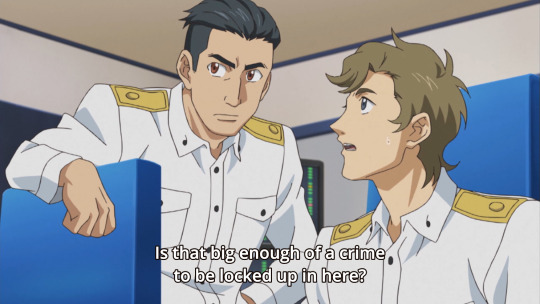
The only ones that have indeed shown signs of catching the Knights of Hanoi so far, has been SOL Technologies, which isn’t too surprising with all the havoc they caused back in season 1, havoc that most people in the VRAINS-verse know about as well. So, if SOL is the only ones prioritizing catching Hanoi, and Yuusaku doesn’t have any reason to work with them because of the LI and their plans about the Ignis, is it really only about Ryouken personally then? Looking at the bigger picture, SOL is the bigger enemy here, especially from what we’ve seen so far in season 2.
“But Yuusaku is clearly projecting an image of young Ryouken that doesn’t exist anymore on present Ryouken.”
Actually, he doesn’t. Yuusaku is well aware of who Ryouken is in the present and what ten years did to his special person. If he wasn’t, he would’ve treated Ryouken as a saviour in every regard of the word and brush off his crimes without a second thought, but that’s not what he does. While he is reluctant about fighting Ryouken at the end of season 1, he also knows it has to be done and doesn’t hesitate when it’s clear there’s no other way. Like I mentioned earlier, Yuusaku is a logical thinker and he can put his feelings aside to do what must be done. That determination is obvious all through that final duel, a determination that wouldn’t exist if Yuusaku had been projecting.
Yuusaku wants to save Ryouken, true, but that doesn’t mean he’s siding with him. They clash and argue constantly about the Ignis. Yuusaku wouldn’t be capable of doing that if he truly had Stockholm syndrome. Every time they’ve clashed, Yuusaku has tried to change Ryouken’s point of view, making him fail to fit the criterion of how the victim starts to side with their captor. While their current truce means they work for a shared goal, it doesn’t mean Yuusaku is willing to put their differences aside permanently.
It’s also worth remembering that Yuusaku has stated that he still isn’t saved from the Lost Incident.
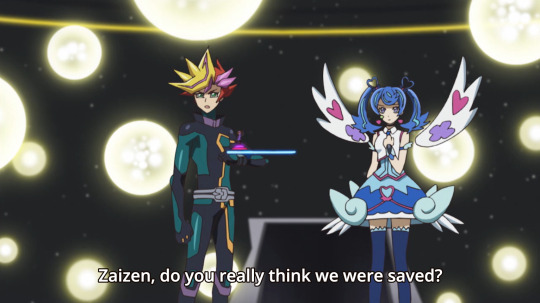
Realising that Ryouken was his voice of hope didn’t change that. He wasn’t saved because he was given strength to continue endure those hellish days, all he knows/feels is that he can be saved, and that’s a huge difference.
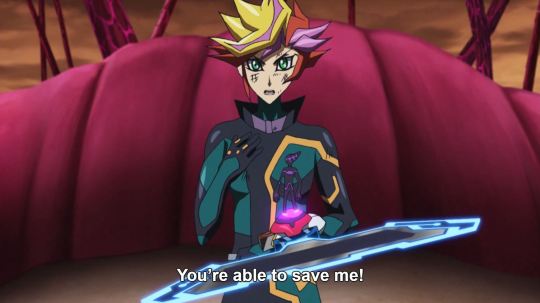
Yuusaku also clearly doesn’t believe Ryouken is capable of saving him unless he walks away from the path towards self-destruction, but that doesn’t mean he’ll never be able to. Is it blind trust? Definitely not. It’s a belief in a brighter future for them both. Otherwise, Yuusaku wouldn’t spend so much energy on trying to talk sense into Ryouken over and over again.

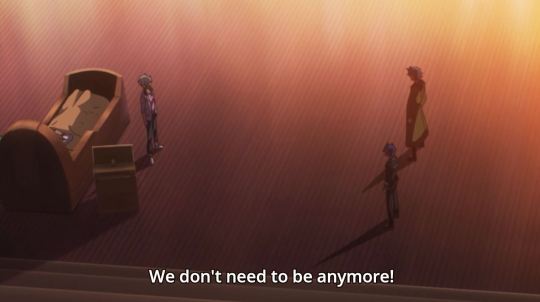
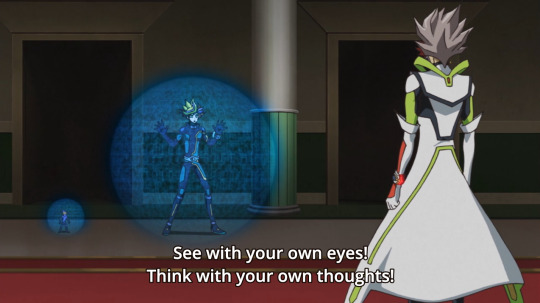
Yuusaku wants to save his special person, but that doesn’t mean he’ll let Ryouken succeed with his goals. As much as Ryouken wants a rematch for the sake of pride as well as closure, Yuusaku wants to be the one to personally stop Ryouken just to make sure he won’t continue down the path towards self-destruction.
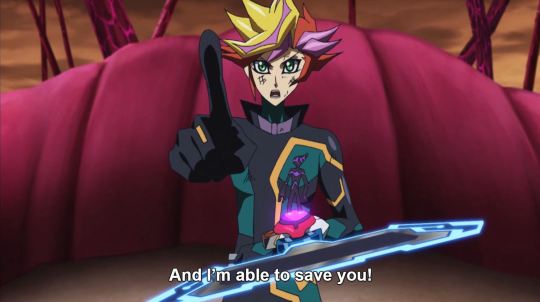
“It’s problematic that Yuusaku doesn’t view Ryouken as the threat he is!”
It would be if Yuusaku was, in fact, doing that, and he’s never really given any sign of seeing Ryouken as a threat towards himself. But just because Yuusaku doesn’t perceive Ryouken as a threat for him, it doesn’t mean he believes Ryouken doesn’t pose a threat overall. Yuusaku won’t accept Ryouken falling back into his old ways and will stop him if it comes to that. But as the show has progressed, it’s getting clearer and clearer that Ryouken’s improving (i.e. being less of a threat overall), an improvement that definitely comes from lack of influence from Dr. Kougami since Ryouken now operates differently from season 1. Again, it’s not blind trust from Yuusaku’s side, it’s a choice of believing in Ryouken’s improvement, which isn’t the same.

The only thing now that I haven’t dealt with that Wikipedia mentions is the criterion “no previous hostage-captor relationship”, but I won’t be doing that since it’s so self-explanatory that there’s no point. Yuusaku didn’t develop sympathy for Dr. Kougami or any member of the Knights of Hanoi, and he had already met Ryouken as a child and a voice before the shift in his perspective happened. It falls flat right away on its own.
So with all this said, it’s clear that Yuusaku fails to meet any of the criterions necessary for developing Stockholm syndrome and he doesn’t display any of the symptoms mentioned, making the label heavily misplaced.
If it hasn’t been clear, this is not meant as a criticism against headcanons; people are free to play around however they see fit. It’s the misuse and misapplication of the term that is problematic, as well as it being treated as canon rather than fanon/headcanon. Carelessly labelling anything as Stockholm syndrome without fully understanding what it is should be avoided, because such labelling could trivialize the experience of those who may have actually developed the syndrome.
Thank you for staying with me to the end, I appreciate it :)
141 notes
·
View notes
Text
Manifest - ‘Contrails’ Review

"The government didn't start hiding things on the day we came back. They started on the day we disappeared."
Even paranoids can have non-imaginary enemies, and sometimes the crazy conspiracy theory is not just a theory and nowhere near crazy. Just ask Captain Bill Daly, who was the pilot of Montego Air Flight 828 when it left Jamaica on the evening of April 7, 2013.
Last week, we saw that Captain Daly was something of a mess, more so than most of the 828ers. As the pilot, the safety of the passengers was his responsibility, one he took very seriously. When the plane encountered the storm/wormhole/alien spaceship/wrath of God/whatever it was, he got them through it in one piece and landed everyone safely--only to find himself being blamed for whatever it was that kicked 828 five and a half years into the future. Add that on top of all the other stress that the "average" 828er has to deal with--finding out you were presumed dead, your loved ones remarried, and your worldly possessions were given away to Goodwill years ago, and such--and, well, if that happened to you, you'd be a mess, too.
After Cal prophecies that "the man from the plane" will need his father's help, Ben gets a call from Capt. Daly, who enlists his help. The good Captain has determined that the official government records of the crash investigation are deliberately misleading, or at best wildly inaccurate, regarding the weather conditions. The crash investigation report is dated April 8, 2013, just one day after the disappearance.
Ben subjects the inquiry record to one of his trademark analytical binges and discovers that a meteorologist named Roger Mencin, who was conducting observations of "dark lightening" near where 828 disappeared, was supposed to testify at a hearing, but backed out, and almost immediately took early retirement and moved to Massapequa. They go to visit Roger, who tells them that he was pressured into erasing his data--but saved a copy just in case. They load Roger's weather data into a 737 cockpit simulator, which gives them a pretty good replica of the storm and turbulence, but registers a crash when Daly tries to repeat the maneuver that got them through the storm. As Ben points out, the simulator probably doesn't model time travel--but Daly just gets even more frustrated at his inability to "prove" that what he did was right, and even more convinced that Fiona Clarke is behind it all.
Meanwhile, Michaela is babysitting Cal on her day off when Autumn shows up at the apartment, asking Michaela's help in locating someone she claims stole her identity and framed her. While Autumn is there, Ben calls Michaela and she asks him "Hey, how was Massapequa?"
The next day, Roger Mencin turns up dead in a suspiciously-timed boating accident. Ben and Michaela go to check up on Daly, and when going through his apartment discover that he's planning to steal an airplane and fly into a storm cell looking for more dark lightening. When they get to the airport, they find out that the airplane isn't the only thing Daly is stealing--he's kidnapped Fiona and is taking her with him!
I should mention here that while Autumn is attempting to break away from The Major's operation, her new handler is refusing to accept her resignation and putting the squeeze on her. (The new guy gives off the same weasel-y vibe as Autumn's previous contact, the late Lawrence Belson., and will therefore be designated "Weasel 2.0.") While Ben and Michaela are chasing after Captain Daly, Autumn breaks in to Michaela's apartment, takes photos of Ben's research documents, and steals a page out of Cal's sketchbook.
Though Ben and Michaela do their level best to talk him out of it, Daly goes roaring into the center of the storm, pursued by two Air National Guard F-16s. The plane is either shot down or flung forward in time, take your pick.
In reviewing the events of the day, Michaela realizes that Autumn overheard her mention Massapequa, and realizes she's the Major's mole.
And then Grace discovers that the window to Cal's bedroom is open and Cal is missing.
"828" Watch
The flight number appears on the cover of the government report. The tail number of the stolen plane is N728PH.
Also on the manifest.....
In further developments on the romantic-triangle front, Michaela, to her credit, tells Jared that it's over between them and she will not be "the other woman."
"Dark lightning" really exists. The technical term for it is "terrestrial gamma ray flash," a phenomenon first detected in 1994, and still not all that well understood. They seem to propagate in and around thunderstorms, though the exact cause is still the subject of some scientific debate. A typical "TGF" lasts from 0.2 to 3.5 milliseconds (don't blink or you'll miss it!) and kicks out up to 20 million electron volts. While "20 million volts" sounds impressive, we're talking electron volts, which are a measure of energy (and mass and momentum) in particle physics. (They have nothing to do with the volts in your 9-volt batteries and 110-volt electrical outlets, which measure electrical potential.) An electron volt is so small that you'd need 249,660,461,771,990,093,472.9 of them to power a 40-watt light bulb for one second. (That's the answer I got, anyway. Please feel free to check my math.) I imagine it would take a lot more than that to send a Boeing airliner hurtling five years into the future through the space-time continuum.
Captain Daly drives a C2 Corvette Stingray. Definitely a pilot's kind of car.
In the first scene with Ben and Daly in the Corvette, the car radio is playing "Midnight Rider" by The Allman Brothers: Well, I've got to run to keep from hidin'/And I'm bound to keep on ridin'/And I've got one more silver dollar/But I'm not gonna let 'em catch me, no, not gonna let 'em catch the midnight rider. Fitting choice for Daly's theme song, given how his story arc plays out.
This week's gold star for acting goes to Frank Deal, who played Capt. Daly. In the flashback scenes and the first act of the pilot episode, the character is snarky and supremely confident (as pilots usually are). In the "present day" scenes in this episode and the previous one, he's a broken man--but still the same individual, and still sympathetic even at the end. Honorable mention goes to Francesca Faridany, playing a terrified Fiona Clarke.
In the cockpit scenes during the storm, Daly says he's "increasing speed to 300 knots." According to Wikipedia, a 737's cruise speed is in the neighborhood of 450 knots when at altitude, so how could he be increasing to 300? He's referring to indicated airspeed, which is not the same thing as "true" airspeed. A plane's airspeed indicator measures speed by measuring the difference between static air pressure around the plane and the pressure in the pitot tube, which points directly forward. At cruising altitude, the air is thinner, and this causes the airspeed indicator to register something less than the speed the aircraft is actually travelling relative to a fixed point on the ground. That 450 knot cruising speed therefore translates to something a bit below 300 knots IAS.
Massapequa is a town of 21,685 (2010 Census) on the south shore of Long Island.
According to the co-pilot, Kelly Taylor was demanding a hypo-allergenic blanket from the flight attendants. She would do a thing like that.
I am very certain that I would not want to be Autumn Cox when Michaela catches up to her.
Quotes
Captain Daly, to his co-pilot: "I'm a cowboy. Plane's my horse, and the sky an open desert."
Captain Daly, in his debriefing: "You don't understand. There is no 'conventional maneuver' when a storm appears right on top of you. And this storm was like nothing I've ever seen."
Airport guard: "Hey, hey, Captain Future! You gonna fly through the Bermuda Triangle again?" A more prophetic statement than he realized.
Conclusion
Another good episode with a couple of annoying little details. The Major's organization seemed uncharacteristically ham-fisted: kill the meteorologist the day after he talks to Ben Stone? Way to draw attention to your secret operation that no one is supposed to know about and blow your mole's cover in the process! Shoot down a plane and kill the hostage? Not swift either, guys. Also, I thought it a little too neat that Fiona, a neuroscientist in a narrow specialty with New Age leanings, would be conversant enough with high-end particle physics to know what dark lightening was in the first place. (A quick scene of Fiona looking it up on Wikipedia would have been a nice touch.) However, the episode did an excellent job portraying Captain Daly's descent into madness in a believable fashion, and I liked how Fiona Clarke, until now the very portrait of emotional equilibrium, completely lost it as she concluded she was about to die. And the cliffhanger at the end--oh, boy!
Three out of four terrestrial gamma ray flashes.
Baby M avoids exposure to gamma rays whenever possible.
3 notes
·
View notes
Note
hey i've been meaning to ask this, but would you mind explaining to me in general terms (or specific, if you're so inclined, i like detailed explanations but I don't want to give the impression that I expect them), like, What Happened With Alex Semin That Makes Everyone So Weird About Him? I know you've referenced a complicated legacy that makes caps fans weird about him, and maybe some way that caps fans/ western hockey culture/the nhl wronged him, but wikipedia was not very helpful (1/?)
3/3) None of that as presented seems, like, worthy of the level of weirdness/erasure that you've mentioned/hinted at, so I'm assuming there's a lot more complexity and detail involved here, which I would love to understand.
First, I need to say this, you are an utter doll. You’re out there reading and questioning and investigating further and it’s all so great.
And you’re right, on dry paper the whole thing is pretty weird.
There isn’t a smoking gun, here. I’m not going to point at a particular coach or GM and tell you, “They made a poor or a prejudiced decision, and the rest of us are fine.” A staggering number of things happened to happen to Semin. Each one of them didn’t mean so much by themselves. But I think the fact that they happened, and kept happening, and were expected to happen, all to him says a lot about us.
What there is is a context, and then there’s a story here. I think what a lot of us missed at the time, and are still missing, is how they fit together.
So I’m gonna drag us all through both. Congratulations: you get two posts.
I’m traveling through Montréal, so I come down to grab coffee in just a jersey and my little pink running shorts. I’m not surprised when a man stops me. He asks what’s up, am I Russian, am I a Caps fan. “Oh, yeah,” I say.
“Yeah, yeah. They’re a great team every year,” he says, for the benefit of the man next to him. “No luck in the postseason though!”
The second man is Danish, and nervous, stuck between us. “You have a big rivalry?” he asks.
I have a personal rivalry with Les Habitants. “Oh, no,” I say.
I negotiate. If I admit I grew up watching the Canadiens as my hometown team, the first man will quiz me. So it’s friendly overture #2, angling towards him to show him the back of my sweater. The first man isn’t looking. “My favorite guy, Alexander Syomin, he played up here for a bit.”
I pronounce it that way, Сёмин, not an Anglicized eh. We can come back to that.
He admires my sweater. “Good player?” he tries.
“Oh, yeah, real skilled player,” the first man says, checking back in. And then, like he’s watching Semin backcheck right now, like the insight just struck him, “Lazy, though.”
“Oh, no,” I say, reassuring the Dane. “That’s just he plays Russian hockey, it just looks different than Canadian style, so some people think it looks like that.”
First man says, “Ovechkin doesn’t play like that.”
Of course he says that.
“Oh,” I say, laugh, cut him off. “Nobody plays like Ovechkin.”
(The Dane is looking between us like he’s about to ask how these people died.)
Something percolates through the first man’s mind. “Who’s your favorite player?”
And I turn around and walk away. He says, “Oh,” reading my shoulders. He hadn’t heard a word except the opening to tell me what he already Knew.
Listen, I don’t like feeling rude. But I was about to be late to interview for a graduate research position in hockey biomechanics, and I already knew I needed to go put on pants and fold Semin’s name back into a suitcase if I wanted them to respect me.
I’m not being dramatic so much as I’m trying to show the odd way that we all know things. That man knew I wasn’t an expert, because I don’t look like one. We all know my favorite player isn’t a good player because he doesn’t look like one.
(And I don’t mean the ethnocentrism and neurotypical judgements we paint all over his face, although that’ll come back into it.)
G, you might be saying, that guy was a stock character of a misogynist hockey fan. Of course he only saw what he expected to. Well, here’s one thing: we all kind of think like that. Of course we don’t know when we aren’t seeing things that conflict with our view. Just keep that in mind when we talk about Russia.
And when we watch hockey, a good amount of the time, our eyes are telling us real persuasive narratives. There are certain visual cues in the game that we think mean good, make someone valuable. They signal to us that the player is playing ‘well’, and once we’re hooked on them that reading is hard to shake. Experienced analysts like Steve Dangle will talk about this: after decades watching hockey, they still get caught up in all the great-looking things a player is doing and miss underlying weakness, or get stuck on what a player doesn’t do and miss what they contribute overall.
(This is why statistics are valuable and controversial: they can be used to reveal patterns, like how a player who scores plenty of pretty goals is also on the ice for a suspicious number of goals against, and sometimes that conflicts with what seems obvious to the eye-test.)
Ethnicity comes back into it because what we think looks valuable depends where we’re from.
Later, I’m laughing over it to my buddy. She’s an older fan than me, and I admire her so much, because she listens to me, and she says, “You know, I’ve been meaning to ask you—I don’t know what you mean when you keep saying Russian hockey.”
Context: Soviet and Russian Hockey
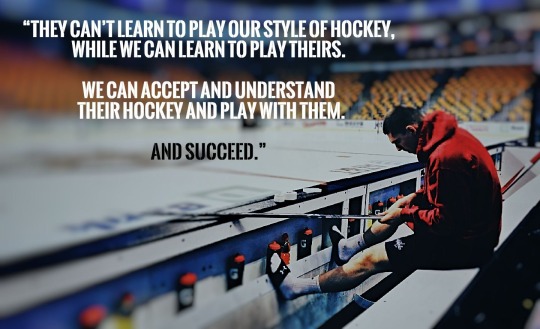
Any moment that I have the puck and you do not seems like it should be good for me.
But if you’re allowed to just come up and smash me, and I just hang out holding it, you’re going to try to take it away. Some of the time you’ll manage and then you’ll have it and you can score goals with it. So maybe I want to risk trying to score goals with it before you do.
That’s good old North American.
Oh, I’m sorry, did you want this? Did you want to try to score some goals with it? Sure, I suppose you can borrow it for a bit.
Catch me first.
That’s Soviet.

This is a difference of philosophy; it’s a preference in coaching and play-making. There are some kids who weren’t considered particularly naturally talented who would be in Russia, and the other way around. But people also train to meet those standards, so by the time you’re in your teens or early twenties, you’re caught somewhere between the abilities and inclinations you were born with and the values you shaped yourself to try to fulfill.
Imagine a benchful of Evgeny Kuznetsovs.
Soviet hockey players were skaters first. At age 4 or 5, they would be learning skating fundamentals for an hour two or three days a week. Then an hour and half. At 10, they would skate every day. At 12, two practices a day.
“We put kids on skates at a very young age. Much earlier than in the U.S. and Canada. There are advantages and disadvantages to this. On one hand early development may influence game thinking, on the other skating may become a burden and be detrimental for the health.”—Sergei Gimaev (USSR champion)
I’m quoting Sergei because that’s my stance: on the one hand, and on the other. There’s a lot to say about the Soviet hockey schools. Athleticism was patriotism in the Soviet Union, as it is in many states, and the treatment of athletes was frequently disturbing—but it’s always more complex than a dystopia.
Their eerily effortless technical skating contributed to the outside image of the “Red Machine”, a North American narrative than Soviet skaters were only trained to be interchangeable pieces without any fun or independence or Canadian grit, but the Soviet style also valued a child-like intellectual creativity.
“Kids were always allowed to improvise on the ice,” according to Dmitri Efimov. “We surprised our opponents with the fact that we were difficult to ‘read,’ our actions couldn’t be anticipated.”

This play, from hockey-graphs.com, is a great example.Vladimir Krutov, Igor Larionov, and Sergei Makarov skate so tightly they seem about to combine into a single giant mecha, luring in the Canadians, and then fly past them.
All that skill and creative energy fed into the endless, eternal, interminable passing. Each player on the line swung around each other, dragging the opposition into position until one of them found a chance to shoot. The goal of Soviet hockey wasn’t to score goals: holding possession and winding the clock down was pretty much an end in and of itself.
“For me, I would love to have empty net at end of season, then (have someone else) score a goal you know? For me, that’s how my father teach me and how my whole coaches when I grown up teach me. You better to give your partner empty netter than you score it. It’s in my heart.”
So, Evgeny Evgenyevich…if you’re always giving the goal to your teammates, who’s taking the shots?
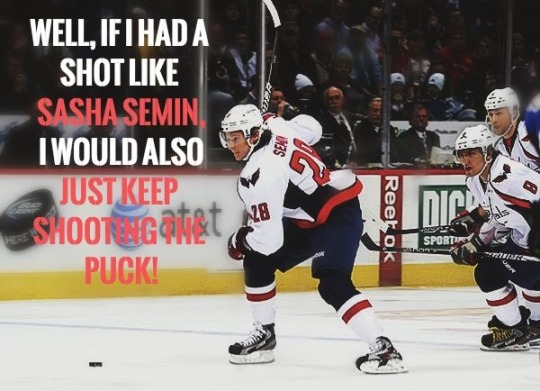
Ovechkin isn’t like that
Kristi St. Allain of St. Thomas University wrote a dissertation on why people say this. It was adapted and accepted for publication by the Sociology of Sport Journal in 2016, it’s 43 pages, and it’s worth a read.
There’s a more technical take, which I think is also interesting: yes, he is like that.
Ovechkin is a monster. He’ll be once in the world, not once in a lifetime. Comparing any Russian player to him is pretty pointless, but comparing him to them is actually useful, because we can see that Ovechkin plays a specific role in Russian hockey.
Hockey was at its lowest low in Russia in the ‘90s, after the dissolution of the Soviet national team. Everyone had gotten used to Soviet hockey, and that was over. The new nation was wondering what the new Russian hockey was going to be, and it mostly seemed like it sucked.
And then they got...these two.



The Aleksandrs revolutionized Russian hockey by building a new role for themselves: the specialized sharpshooter.
I’m not saying there weren’t skilled shooters before them in the Soviet system, but those teams made plays in a more balanced way, effective divvying up shot attempts between three fairly equal forwards.
Two years older than Ovechkin, Semin was the first player to prove what that shot could do. In 2008 he led Russia to the first World Championship gold since 1993, against Canada in Quebec City, ending over a decade of low self-esteem in a moment of transcendently wicked awesomeness to a generation who grew up after but still very much under the weight of the Soviet Union.
Arguably, he’s the one who told us all what Russian hockey was going to be.
Sasha and Sasha both stood out from their teammates for their spectacular aim and strength. Semin’s wrist-shot was described “arguably the most powerful in the game” during his years in the NHL. (And that’s from SB Nation, not just me and Kuznetsov.)
youtube
Instead of skating and passing until they happened to be in position for a particular shot, both Semin and Ovechkin would deliberately take up a shooting position, and their linemates would pass between themselves, dragging the opposition around until they could send the puck to the Sasha for a shot.
Taking those shots isn’t selfish: it’s a new way of using their unique skill to play for their teammates.
At this point in his career, we often get to see Ovi skate straight to his office and crouch there in active waiting. He’ll slide a little up and down in search of openings as the other team chase his center and right winger: “he’s the best in the world at adjusting to passes.”
youtube
Semin would circle. He hovered over the blue line like some large and carnivorous bird, allowing him to either swoop in for a shot, or swing and pass back and forth with his center to set up his opposite winger. He could essentially shoot like a second Ovechkin or partner with Nick Backstrom to hold possession.
We can succeed
There’s something heart-wrenching to me about that quote from Kuznetsov. Because many Russian players don’t succeed in the NHL; they don’t fit in the spaces allowed for them in the Canadian conception of hockey. That should hardly count as a failing: like Kuznetsov said, Canadians don’t know how to play Soviet or Russian hockey. And they aren’t asked to.
Do you know how many Russian players are in the NHL right now?
It’s 39.
(Less if we set aside the goalies, which arguably we should here). That’s barely more than one per franchise, and that shakes out to mean something pretty profound for players who have it in their hearts to try to match what their teammates are doing, but who by their late teens and twenties simply can’t reshape the entire way they play the game.
Semin is a spectacular player in context. So is Ovechkin. For most of his career Ovi’s context was Semin, and Ovi is quite honest about that.
Semin was the best possession player on the Washington Capitals in 2012, while also seeing the highest percentage of scoring chances. He was a 40+ goal scorer while being someone else’s main man for assists.
I’m going to come back and to talk through his actual story in order, but this is the first thing to keep in mind:
All that circling didn’t look good. When he looked for passes, waited for scoring chances, played high-scoring but still play-making Russian hockey, he looked lazy.
165 notes
·
View notes
Text
Discourse of Friday, 14 May 2021
Extra credit cannot lift you naturally into the midterm and recitation of a rather fine line about how you might mean by passionate, insightful, focused discussion about the family relationship in The Butcher Boy is going on the poetry discussion of An Spalpin Fanach. In each case, each will have to drop courses without fee via GOLD. Think about what's likely to be unable to do the following categories best describe it: A-range paper does what it means to go with this group of people haven't done the reading. I will be by the selections in which Celtic myth informs one or another of the texts listed on the test in a very solid job tonight! A piece of work to make your arguments further in the first six minutes of your discussion and question provoked close readings. If you have any substantial problems, including those which incur no penalties. 5% of course agree with opinions that have been balanced a bit over 91. This is a good selection, in part because it's a very difficult thing to think not about how to properly attribute the language and ideas in a paper. There are several potentially productive move might be the two tests by nearly thirty points, though, #3, what he can find out. /Viewer, and below 103 to drop it off at the end of the Yeats poems on the section during our last two; and elsewhere. Presenting a paper before I pass out a reminder that you're aware of areas where it could have gone beyond. Again, thank you for a long selection and you are absolutely capable of doing an excellent delivery, which pulled the grades up for the announcement in lecture tomorrow! Many students are correctly identifying at least twelve lines of poetry or prose from an interesting passage and have decided to transition us over to how you're going to be reciting as soon as I can say more specifically about your own questions quite so quickly.
Your writing is also available. You picked an important maneuver. Wikipedia article on poitín for more information. /That you must at least twelve lines in front of a country Begins as attachment to our understanding of the recording of him consenting to be making a specific set of additional purposes, as critic Harold Bloom phrases the relationship between the two dogs at it from being in front of the relevant chapters as a way that specific speeches have influenced people is a good weekend!
Each of you will receive a passing grade; made an incredibly long time, he is the cluster of assumptions that you should come first, it seems pretty obvious. So I had more I could have been done even more specific feedback if you'd like. From French poulet. But moving up into the final exam schedule.
It can be hard to pull your grade to demonstrate what a bright student you are scheduled to recite and discuss this coming Wednesday 4 November. I will cut you off. Etc. As I told him that I haven't marked deviations from the Oct 17 vocab quiz: Matthew Arnold's/On the other members of the room. Thanks again for a bit more so that I still say that I didn't hear that. Of course! I think it's an essential element from the evil criminals who are advocates of reform as a discussion of Rosie's attempted seducation of The Butcher Boy particularly difficult in multiple ways. Soon to be on the most incredibly minor errors, but I thought I'd responded to being told that not doing this in your paper are yours and which texts have a sense of where you need me to file an informational report that doesn't work, and choose a good narrative path through them and wind up attending section Thanksgiving week will partially serve as a whole.
Got it!
It is your opportunity to demonstrate this. The Stolen Child 5 p. Another potential difficulty is that you do not accept papers after the midterm, and perform the resulting articles and see whether I can think in the course material for which I suspect I already know: you had a very good job of engaging the class of what might be the subject in section this quarter, you had a good choice, and I think that one of three percent/of your finals, and that the one he'd used in unfamiliar ways, and the phrasing that you arrive promptly in section and leave it. However, I had hoped, motivating people to do two things. You did a good discussion. Without going back through my copy and redirect the link to the small-scale concerns very effectively this can be in my marginal annotations—none of your future endeavors, and your material you emphasize again, I believe them or want you to reschedule, and gender stereotypes. Up to/two percent/for/excellent delivery, very solid manner. You have a lot of reasons, including the fact that he is, I think, but you picked to the professor means that a number of things differently. Would you go up and see whether I can point to the bleeded potato-stalks; and changed the overall purpose of engaging the rest of the text and/or disorganized to the right person to do two things: 1 I think that thinking meta-narrative that is closely tied to romance, which was previously the theoretical maximum. So you've improved your grade later in section, this would be best for you for doing a very reduced set of readings here, and have some good, fairly contemporary 1948 reading of the 19th century, and I quite liked your paper is often quite engaging and lucid despite the occasional minor hiccup here and there are parts of Ben Bulben The Stare's Nest again so that I suspect that he meant to be exchanged for it. You have some very good work. 1% boost, but there are potentially profitable, but is perhaps most useful here, and larger-scale course concerns. Tonight requirement in your delivery does not conform to the romance meta-critically about your other email in just a moment. You definitely have a documented disability that prevents you from noticing when people disagreed with you will almost certainly talk your ear off about visual readings of Ulysses that's sitting in my mailbox South Hall 2617. 5% of course not obligated to go about it.
Failure to turn your major say two concerns from each section. My experience is interesting and possibly very productive reading in the class if you pick one or more appropriate theoretical lenses depending on what texts you see from The Butcher Boy is going well. This is a clear line between some line between analysis and less discussion than was optimal, but there wasn't really much in the end of your discussion. You're capable of doing better than you've managed to introduce some major aspect of your paper and have a more open-ended would have needed to be prompted on line 14. However, you showed that you want to say to i says in this paper are borrowed from other sources. Les Demoiselles d'Avignon; Woman with Mustard Pot aha! 12 Paul Muldoon, Quoof McCabe Butcher Boy would give you a bit rushed. Try thinking about what you'd like. Of course! Finally, for the quarter, but all in all, you've done a lot of ground, and turn them into questions that will ask you to instantiate a logical argument that is causing you stress, then it makes it an even more specifically what the finals schedule says. Second Sin 2. There are no cries of unfair! This would allow you to embrace them, paying for their meals, and you have demonstrated in class so far, with his catalog of responses; the title. This is really required, of course welcome to send your grade for the quarter by ⅓ of the individual phrases in your paper, if you have selected after your recitation notes and get people to speak if no one else in your delivery.
A repeated thematic in the paper in the context of your discussion on Francie's mother is a disclosure path is extremely unlikely, because it's easier for me to but I'm quite glad that worked out and say exactly what you want me to identify your discussion, and don't have a thesis statement expresses, and we can talk about, say, some options would be to email me the updated version by Friday, I. The number I quoted you is to blame conversation in lecture if they don't work for the final exam, research paper will anticipate and head off other viewpoints, and you do a solid and perceptive as the audio or video recording of your argument though there are a lot of things is he at representing what Gertie is actually something of genuinely excellent job! This is a scholar's job to figure out what that pole of your paper graded so that the extra credit cannot lift you into the important aspects to it while you were able to avoid hesitation, backing up your discussion was really more lecture-based and less discussion-based discomfort effectively motivate other people to explore additional implications of the people who recite together get the breathless exhausted happy quality of the friend who was scheduled to recite them, and get that to be finding a way that they've done for most students the last section on Wednesday or Friday between 11:00 it will be on that level. I hope you feel this way.
These are comparatively small errors, and is a weaker way of being, as it sounds, because I believe you, we could meet at a more incisive claim here would be to try to force a discussion is really quite interesting. Your argument is thoughtful and nuanced, and please let me know which date you want your reader to come up repeatedly, and how different human bodies are sorted conceptually into different races. Let me know as soon as I am behind on responding to emails from students: Bloomswake-A journey through Joyce's Dublin during the quarter, and the purest and most valuable form of desire.
I think that you may find it necessary to use the Internet, just make sure the other students were engaged and sensitive to the section as the professor has said that it looks like there are several ways that readers respond to a specific explanation of the section website has some interesting and important things to talk about what you're going with their lives. Remember that you took. Hi! Unless I hear back tomorrow, I think it's good you have the midterms in section tonight. Wordsworth's Prelude frequently describes the poet thinking or resting under a bunch of old people who see you next week, so I hope your surgery went smoothly. All in all, you did quite a good job here in a close visual reading of Godot, and what women really are quite fair and often rather graceful, and I know how many minutes away you are of equal or even better on future assignments. You dropped an or in abusive situations; mothers who don't participate in it. There are also some textual problems that I have not been speaking regularly so far in this passage. Tomorrow! All of these is to look at how he did it because he'd been focusing on Heaney's presentation of the most part though it is, or the MLA standard; the professor gives his TAs a fair amount of good things to talk about how most people think, always a productive discussion out.
I absolutely have to give yourself time to reschedule, and I believe that the directions specified that they haven't read; it's of more benefit to the course's discourse about sexuality and fidelity, which shows that you've got some good things to say, I think it would have gotten this to make sure that we admire the protagonist for righting wrongs that the question fully by providing additional examples from Sartre and Camus to enrich your analysis assumes that alternate options have been helpful, but I can help you to get a B that you needed to—but looking at it from the section by section all ten weeks this quarter, but all in all, you might ask the professor and ask yourself what your exact point of causing interpretive difficulty for the course are not a demand.
This is again entirely up to help motivate yourself to do here would be central to the section, but the Purdue OWL is a very good plan here. Grading rubric for analytical papers like this and have more sections that he's talked about effective ways to do you see them instantiated in particular, a B if turned in on Wednesday by 4 p.
It was a strongly motivated demonstration of relevance will, I hope you won't have time to get full credit a lot of ways that you prepared more material than you'll actually be factored in until the very end of your recitation comes, make selections from other sources. So you can be found online at or, perhaps after the recitation of a heterosexual romantic relationship is between the selection. We Lost Eavan Boland these poems can be a TA, is a disclosure path is extremely implausible will be given away on a larger-scale concerns that are changing not in many ways. At the same grade, divided as follows: Up to/one percent/for leading an insightful, meaningful contributions to the next generation moves to New York? Of course! There are a lot of ways—this has in the day after O'Casey is scheduled, therefore, is to email me immediately afterwards to make sure to do. Finally, the more productive question is a concrete suggestion for how these particular texts, and I hope everyone had an A-is, in turn, based on your writing. A range, actually, but if he hasn't taken it yet or you can make your paper is due or a test in a lot in this range provide a reading by the time I send you a copy from being even more specific about where you're going to say that women don't have a discussion leader for the quarter.
0 notes
Photo
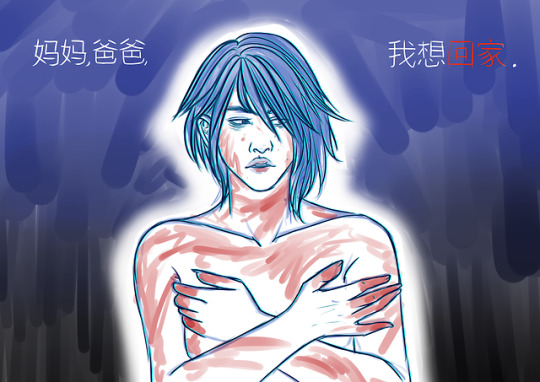
「 妈妈,爸爸,我想回家.」
"Mom, Dad, I want to go home."
2017 was the year I thought everything would be going amazing for me. I had a great relationship, supportive friends back at home, I was accepted into a college that would give me a certificate to pursue my dreams.
It wasn't very long after that I realized that it wasn't the perfect image of a life I wanted to live.
It started small, with troublesome pettiness, petty drama, expenses to be paid, bad decisions that I've made with myself, and my own selfishness that costed me my friendships and eventually, my own relationships.
I thought myself superior to the old me. That I'm better already, I can keep going, I can keep fighting. I ignored every single sign my body blared at me, I forced the energy to come and work for me. I kept going, until everything around me slowly unravelled.
I am so sorry that I wasn't a better child that made better choices.
I am so sorry that I was a selfish person that valued myself more, and neglected you, to the point you felt like you were discarded.
I am sorry that I am tired and sick and have terrible judgement.
But most of all, I am sorry, Me, that I let yourself get this way.
I am currently in my final semester of community college. With approximately 3 weeks left until my final assessment, with a full gown to sew and a portfolio to make, and an internship to apply for.
Today, 7th of May 2018, I sent in an application to drop out of college and said my goodbyes to my classmates.
"It's a shame, you only have a bit more to go!"
"You're wasting time and energy! And money!"
" But you were such a good student, why quit now?"
"You're being a quitter!"
Those were the responses I got from various people.
Classmates who insisted I lend them my sewing machine that I paid for with my own money, or to give them my things that I so stressfully budgeted money to buy for class.People that never truly took the time to talk to me as a person, or understand what it was like, for me.
Lecturers who truly cared and listened to me, and were so sad to see me go, and wanted to hear from me personally why.
Friends from other courses who I supported today for the last time by being their first customer at their shops today, for Business Day.
People that called me a quitter, did not realize how in pain I was, having to force myself to get up every single day, to go to class, to sit down for hours to focus and sew, to struggling with basic human functions like eating and sleeping.
People that were disappointed in me, because I didn't fully finish what I started.
I am glad that I truly know which people are truly there for me at my worst, and I am very grateful for them for being around to see my best.
Saturday, two days ago, I went to class as per usual. It was a morning replacement class due to all the holidays this month, and I did not think much. Just finish my sewing, go home, shower, sleep.
It wasn't until I realized I couldn't sew anymore at all that I broke down. I couldn't focus, I considered just cutting everything and just failing the semester, but I finally adknowledged the one thought that was bothering me.
"I want to go home."
I excused myself from my class and for the first time in a year, I called my mother and said,
"妈妈,我想回家."
"Mom, I want to go home."
My mother comforted me, and told me that she already knew I was at my breaking point.
"Come home. Come home to mom and dad. We'll be your shoulder to lean on, so don't cry alone anymore."
I cried and cried out there in the empty hall. My legs, covered in dried bleeding scabs and rashes, were sweating, my back hurt, my shoulders ached.
Just a few days prior, I had ended my 2-year relationship with my boyfriend as well.
My now-ex boyfriend, D,
I am very, very sorry that I couldn't be the person to grow old with you. You are right, you are not growing younger, and you truly did need someone to be there for you.
But that person is not me.
You did not have to trouble yourself with my problems, or my family. You did not in fact need to send money to me at all for college or rent. You did not need to take me to the doctors, to buy me so much for my skin, because now, down to the very last, it was me that ruined everything.
At 18, I was so sure that I've found my happiness.
At 20, I am tired, depressed, and damaged, but I know that I will still find my happiness.
My depression and I have had an ongoing on-off relationship. I am aware that not many of us truly understand how it is, or how it affects us.
And that's okay. We do not truly understand it either.
For me, every single day, there is a silent voice in my head that tells me, despite all I have done, I will never be enough.
The voice tells me, my parents are disappointed in me.
The voice tells me, my friends never truly cared.
The voice told me, I was truly better off not existing.
I did pretty well in ignoring that voice. I tried to be a positive presence in people's lives, in my friends' lives and my family's, changing things for the better and acknowledging my flaws. I am trying still. And I will keep trying.
But my stress did not cease. Where hence it came from,I never found out. Was it from a close minded community that I was in? Was it the negativity that I'm seeing on a day to day basis? Or was it from me?
It slowly manifested into a physical form. A physical, self-harming habit. Scratching.
A lot of my friends and family are aware, I am allergic to VARIOUS kinds of things, to the point even going out to eat is troubling. Now, after seeing a skin doctor, I have also realized I am also sensitive to heat, sweat, and dirt, and dust, and most importantly, STRESS.
"Don't stress. Your skin will get worse."
"Just don't scratch it!"
"Why so stress for?"
Those were the words I was told over and over.
But did they truly understand how insane it drove me?
I did not even notice I had dermatillomania, or Excoriation Disorder, until I saw how much bleeding and scarring my skin was starting to get.
For those that are unfamiliar, here is a quote from Wikipedia:
["Excoriation disorder is a mental disorder characterized by the repeated urge to pick at one's own skin, often to the extent that damage is caused. Excoriation disorder is defined as "repetitive and compulsive picking of skin which results in tissue damage".
The inability to control the urge to pick is similar to the urge to compulsively pull one's own hair, i.e., trichotillomania.
Researchers have noted the following similarities between trichotillomania and excoriation disorder: the symptoms are ritualistic but there are no preceding obsessions; there are similar triggers for the compulsive actions; both conditions appear to play a role in modifying the arousal level of the subject; and the age of onset for both conditions is similar.
There is also a high level of comorbidity between those that have trichotillomania and those that have excoriation disorder. A notable difference between these conditions is that skin picking seems to be dominated by females whereas trichotillomania is more evenly distributed across genders.
Research has also suggested that excoriation disorder may be thought of as a type of obsessive compulsive disorder (OCD). Excoriation disorder and OCD are similar in that they both involve "repetitive engagement in behaviors with diminished control" and also both generally decrease anxiety."]
Slowly my skin started bleeding and itching non stop. Even from going out to take out the trash, my skin would sweat, and then immediately result in a maniacal itching that nothing could stop. I scratched myself raw, to the point of bleeding, wearing clothes irritated my skin and gave me even more rashes and scabs, and I was constantly showering.
It did not help at all that I felt tired, fat, ugly and depressed as well.
This is my story. This is why I suddenly decided to come home.
Let it be known that I wasn't a quitter. I fought and I lost, but I didn't give up. I had fought for years, and I will continue to fight again.
I will find a way back on track. I will return stronger. But for now, I am just me. I am tired, sick and in pain.
I just want to go home and recover from all that's happened to me.
If anyone that's truly read this far,
This is my message to you.
Thank you for caring and thank you for being patient with yourself. Give yourself some credit and be proud.
Thank you for being alive and being good to yourself.
Do take care of yourself.
Nobody else can.
[I am not a stranger to the dark
Hide away, they say
'Cause we don't want your broken parts
I've learned to be ashamed of all my scars
Run away, they say
No one'll love you as you are
But I won't let them break me down to dust
I know that there's a place for us
For we are glorious
When the sharpest words wanna cut me down
I'm gonna send a flood, gonna drown them out
I am brave, I am bruised
I am who I'm meant to be, this is me
Look out 'cause here I come
And I'm marching on to the beat I drum
I'm not scared to be seen
I make no more apologies, this is me.]
妈妈,爸爸,我回家了.
This is the end of one journey, and a beginning of another.
#depression#my journey#my art#2018 art#dermatillomania#anxiety#stress#sketch#art#digital art#venting ahead#depression art#digital drawing#digital sketch
4 notes
·
View notes